Mitchell Hadley's Blog: It's About TV!, page 134
July 29, 2019
What's on TV? Thursday, August 2, 1962
 Back home again in Indiana this week, the Indianapolis issue to be precise, with some help from outlying areas. One of the interesting things introduced by this geographic area is that not everyone resides in the same time zone, and in 1962, not all cities in Indiana observed Daylight Saving Time. (The complicated, not to say garbled, history of time in Indiana can be found
here
.) Caveat videntium, you might say.
Back home again in Indiana this week, the Indianapolis issue to be precise, with some help from outlying areas. One of the interesting things introduced by this geographic area is that not everyone resides in the same time zone, and in 1962, not all cities in Indiana observed Daylight Saving Time. (The complicated, not to say garbled, history of time in Indiana can be found
here
.) Caveat videntium, you might say.3 WCIA (CHAMPAIGN) (CBS)
Morning
7:25 INSPIRATION TIME—Religion
7:30 TINKER TIME—Children
7:55 WEATHER—Ed Mason
8:00 CAPTAIN KANGAROO—Children
9:00 CALENDAR—Reasoner
9:30 I LOVE LUCY—Comedy
10:00 VERDICT IS YOURS
10:30 BRIGHTER DAY—Serial
10:55 NEWS—Harry Reasoner
11:00 LOVE OF LIFE—Serial
11:30 SEARCH FOR TOMORROW
11:45 GUIDING LIGHT—Serial
Afternoon
12:00 NEWS, WEATHER, FARMS
12:30 AS THE WORLD TURNS
1:00 PASSWORD—Allen LuddenCelebrities: Abe Burrows, Jayne Meadows
1:30 HOUSE PARTY—Linkletter Guest: Dr. James Peterson
2:00 MILLIONAIRE—Drama
2:30 TO TELL THE TRUTHPanelists: Mimi Benzell, Phyllis Newman, Richard Hayes, Darren McGavin
2:55 NEWS—Douglas Edwards
3:00 SECRET STORM—Serial
3:30 EDGE OF NIGHT—Serial
4:00 POPEYE AND SHERIFF SID
5:45 NEWS—Walter Cronkite
Evening
6:00 NEWS, WEATHER, SPORTS
6:25 CLOSEUP—Paul Davis
6:30 HUCKLEBERRY HOUND
7:00 FRONTIER CIRCUS—Western
8:00 BRENNER—Police
8:30 ZANE GREY—Western
9:00 MacLeish-Van Doren DIALOGS—Talk SPECIAL
10:00 NEWS, WEATHER, SPORTS
10:15 MOVIE—Drama“Arise My Love” (1940)
I mentioned the MacLeish-Van Doren dialogs on Saturday, but this really is a strange way it's listed, with the names in lower case and "Dialogs" in all caps. But then, these guys were really smart; maybe they told TV Guide to print it that way.
4 WTTW (INDIANAPOLIS) (Independent)
Morning
11:55 DAILY WORD—Religion
Afternoon
12:00 LUNCHTIME CARTOONS
1:00 JACK LaLANNE—Exercise
1:30 MOVIE—Drama“Flight for Freedom” (1943) Part 1
2:30 INDIANA UNIVERSITY
3:00 COFFEE WITH CARTER
4:00 DICK TRACY—Cartoons
4:20 MOVIE—Drama“Our Leading Citizen” (1939)
4:30 POPEYE—Cartoons
5:45 ROCKY AND HIS FRIENDS
Evening
6:00 RUFFLES’ PARTY
6:30 JEFF’S COLLIE—Drama
7:00 YOU ASKED FOR IT—Smith
7:30 WYATT EARP—Western
8:00 RACING FROM SPEEDROME
9:00 INTERNATIONAL CAFÉ
10:00 MOVIE—Western “She Wore a Yellow Ribbon” (1949)
The Indianapolis Speedrome, not to be confused with the Indianapolis Motor Speedway, is still in operation today . If I'd been watching TV back then (and if I'd lived in Indiana), Racing From Speedrome is what I'd have watched.
6 WFBM (INDIANAPOLIS) (NBC)
Morning
7:00 TODAY—ChancellorGuest host: Ray Scherer. Guests: the Teddy Wilson Trio
8:25 GREATEST HEADLINES“Today” continues at 8:30 A.M.
9:00 MOVIE—Adventure“Diamond Frontier” (1940)
10:30 PLAY YOUR HUNCH COLOR
11:00 PRICE IS RIGHT—Bill Cullen COLOR
11:30 CONCENTRATION
Afternoon
12:00 FARMS, NEWS—Harry Martin
12:25 GREATEST HEADLINES
12:30 TRUTH OR CONSEQUENCES—Bob Barker
12:55 NEWS—Ray Scherer
1:00 PETER GUNN—Mystery
1:30 YOUR FIRST IMPRESSION
2:00 JAN MURRAY COLOR
2:25 NEWS—Floyd Kalber
2:30 LORETTA YOUNG
3:00 YOUNG DR. MALONE
3:30 OUR FIVE DAUGHTERS
4:00 MAKE ROOM FOR DADDY—Comedy
4:30 ALL HANDS ON DECK
5:00 MOVIE—DramaFrances Farmer Presents: “Spring Reunion” (1957)
Evening
6:45 NEWS—Chet Huntley, David Brinkley
7:00 NEWS, WEATHER
7:25 GREATEST HEADLINES
7:30 OUTLAWS—Western
8:30 DR. KILDARE—Drama
9:30 LIVELY ONES—Music COLOR Host: Vic Damone. Guests: Ella Fitzgerald, Joe Williams, Shelly Manne, Gene Krupa, Louis Bellson, Mamako, Mitzi McCall and Charlie Brill
10:00 SING ALONG WITH MITCH—Songs COLOR Guests: Jerry Vale, Sandy Stewart
11:00 NEWS, WEATHER, SPORTS
11:30 TONIGHT—Variety COLOR Guest host: Merv Griffin
1:00 COMEDY CAPERS
1:15 NEWS
Frances Farmer happened to be in Indianapolis in 1958, appearing in a play, when an executive with WFBM saw her and thought she'd be a great choice to host the station's upcoming classic movie program. Not only was she the hostess, she also frequently interviewed celebrity visitors to Indianapolis. The show remained on the air until 1964
8 WISH (INDIANAPOLIS) (CBS)
Morning
7:30 CHAPEL DOOR—Religion
7:45 CARTOONS—Children
8:00 CAPTAIN KANGAROO—Children
9:00 MY LITTLE MARGIE—Comedy
9:30 JUNE FORD—Variety
10:00 CALENDAR—Reasoner
10:30 I LOVE LUCY—Comedy
11:00 VERDICT IS YOURS
11:30 EDGE OF NIGHT—Serial
Afternoon
12:00 LOVE OF LIFE—Serial
12:30 SEARCH FOR TOMORROW—Serial
12:45 GUIDING LIGHT—Serial
1:00 NEWS, WEATHER—Donnella
1:15 FARM AND HOME—Leamon
1:30 AS THE WORLD TURNS
2:00 PASSWORD—Allen LuddenCelebrities: Abe Burrows, Jayne Meadows
2:30 HOUSE PARTY—Linkletter Guest: Dr. James Peterson
3:00 MILLIONAIRE—Drama
3:30 TO TELL THE TRUTHPanelists: Mimi Benzell, Phyllis Newman, Richard Hayes, Darren McGavin
3:55 NEWS—Edwards
4:00 SECRET STORM—Serial
4:30 MOVIE—DramaEarly Show: “Navy Wife” (1956)
Evening
6:00 LIFE OF RILEY—Comedy
6:30 WHIRLYBIRDS—Adventure
7:00 NEWS, WEATHER
7:15 NEWS—Walter Cronkite
7:30 TALLAHASSEE 7000—Police
8:00 FRONTIER CIRCUS
9:00 BRENNER—Police
9:30 THIRD MAN—Mystery
10:00 MacLeish-Van Doren DIALOGS—Talk SPECIAL
11:00 NEWS, WEATHER
11:15 MOVIE—SuspenseLate Show: “Three for Jamie Dawn” (1956)
Who, I wondered, looking at the panelists on To Tell the Truth, is Mimi Benzell? (I do this on occasion.) The answer is here .
10 WTHI (TERRE HAUTE) (CBS, ABC, NBC)
Morning
8:00 CAPTAIN KANGAROO—Children
9:00 CALENDAR—Reasoner
9:30 I LOVE LUCY—Comedy
10:00 VERDICT IS YOURS
10:30 BRIGHTER DAY—Serial
10:55 NEWS—Harry Reasoner
11:00 LOVE OF LIFE—Serial
11:30 SEARCH FOR TOMORROW
11:45 GUIDING LIGHT—Serial
Afternoon
12:00 NEWS, WEATHER, FARMS
12:30 AS THE WORLD TURNS
1:00 PASSWORD—Allen LuddenCelebrities: Abe Burrows, Jayne Meadows
1:30 HOUSE PARTY—Linkletter Guest: Dr. James Peterson
2:00 MILLIONAIRE—Drama
2:30 TO TELL THE TRUTHPanelists: Mimi Benzell, Phyllis Newman, Richard Hayes, Darren McGavin
2:55 NEWS—Douglas Edwards
3:00 SECRET STORM—Serial
3:30 EDGE OF NIGHT—Serial
4:00 UNITED FUND STORY
4:15 MOVIE—Musical“I’ll Take Romance” (1937)
Evening
6:00 NEWS, WEATHER, SPORTS
6:15 NEWS—Walter Cronkite
6:30 ACCENT—John Ciardi
7:00 MY THREE SONS—Comedy
7:30 LEAVE IT TO BEAVER—Comedy
8:00 BRENNER—Police
8:30 ZANE GREY—Western
9:00 MacLeish-Van Doren DIALOGS—Talk SPECIAL
10:00 NEWS, WEATHER, SPORTS
10:30 UNTOUCHABLES—Drama
11:30 NEWS—Jim Buckalew
Brenner is a police drama starring Edward Binns and James Broderick as father-and-son policemen, and though I've never been a fan of either actor, the show is really quite good; I particularly like Binns's performance as an internal affairs cop; it causes me to view his other performances in a different light. The executive producer is Herbert Brodkin, who also did The Defenders and Coronet Blue.
13 WLW-i (INDIANAPOLIS) (ABC)
Morning
8:15 FIVE MINUTES TO LIVE BY
8:20 NEWS, WEATHER
8:30 OPERATION ALPHABET
9:00 KINDERGARTEN COLLEGE
10:00 JANE WYMAN—Drama
10:30 M SQUAD-Police
11:00 ERNIE FORD—Variety
11:30 YOURS FOR A SONG
Afternoon
12:00 RUTH LYONS—Variety COLOR
1:30 CAMOUFLAGE—Don Morrow
1:55 NEWS—Alex Dreier
2:00 DAY IN COURT—Drama
2:30 SEVEN KEYS—Jack Narz
3:00 QUEEN FOR A DAY—Bailey
3:30 WHO DO YOU TRUST?
4:00 AMERICAN BANDSTANDGuest: Aretha Franklin
4:50 AMERICAN NEWSSTAND
5:00 CASPER AND COMPANY
5:30 GOLF TIP—Dow Finsterwald
5:35 STOCK MARKET REPORT
5:45 THIS FUNNY WORLD—Comedy
5:50 SPORTS, NEWS, WEATHER
Evening
6:15 NEWS—Ron Cochran
6:30 MAN FROM COCHISE—Police
7:00 WORLD OF GIANTS—Adventure
7:30 OZZIE AND HARRIET
8:00 DONNA REED—Comedy
8:30 REAL McCOYS—Comedy
9:00 MY THREE SONS—Comedy
9:30 LAW AND MR. JONES
10:00 UNTOUCHABLES—Drama
11:00 NEWS, WEATHER, SPORTS
11:30 STEVE ALLEN—VarietyGuests: Mel Brooks, Libi Steiger, John Gabriel
1:00 NEWS
WLW-i was part of the Crosley group of television stations; hence, the appearance of Ruth Lyons' 50-50 Club , which originated in Cincinnati and was extremely popular throughout the area.
15 WANE (FT. WAYNE) (CBS)
Morning
7:50 DAILY WORD—Religion
8:15 NEWS—Bob Carlin
8:00 CAPTAIN KANGAROO—Children
9:00 MOVIE—Drama “The Mind Reader” (1933)
10:25 LOCAL NEWS—Bob Carlin
10:30 I LOVE LUCY—Comedy
11:00 VERDICT IS YOURS
11:30 BRIGHTER DAY—Serial
11:45 NEWS—Harry Reasoner
Afternoon
12:00 LOVE OF LIFE—Serial
12:30 SEARCH FOR TOMORROW—Serial
12:45 GUIDING LIGHT—Serial
1:00 ANN COLONE—Variety
1:25 LOCAL NEWS—Bob Carlin
1:30 AS THE WORLD TURNS
2:00 PASSWORD—Allen LuddenCelebrities: Abe Burrows, Jayne Meadows
2:30 HOUSE PARTY—Linkletter Guest: Dr. James Peterson
3:00 MILLIONAIRE—Drama
3:30 TO TELL THE TRUTHPanelists: Mimi Benzell, Phyllis Newman, Richard Hayes, Darren McGavin
3:55 NEWS—Edwards
4:00 SECRET STORM—Serial
4:30 EDGE OF NIGHT—Serial
5:00 DANCE DATE—Jack Powell
Evening
6:00 LIFE OF RILEY—Comedy
6:30 NEWS, WEATHER—Wilson
6:45 NEWS—Walter Cronkite
7:00 WANTED—DEAD OR ALIVE
7:30 GUESTWARD HO!—Comedy
8:00 FRONTIER CIRCUS
9:00 BRENNER—Police
9:30 ZANE GREY—Western
10:00 MacLeish-Van Doren DIALOGS—Talk SPECIAL
11:00 NEWS, WEATHER, SPORTS
11:20 MOVIE—Melodrama“The Monster and the Girl” (1941)
I don't know much about Ann Colone's show at 1:00 p.m., but I'll bet it didn't stink. (beat) Actually, as you can read here , she was one of the pioneers of television, and deserves to be much better-known than she is.
18 WFAM (LAFAYETTE) (CBS)
Morning
10:00 CALENDAR—Reasoner
10:30 I LOVE LUCY—Comedy
11:00 VERDICT IS YOURS
11:30 EDGE OF NIGHT—Serial
Afternoon
12:00 LOVE OF LIFE—Serial
12:30 SEARCH FOR TOMORROW—Serial
12:45 GUIDING LIGHT—Serial
1:00 FILM FEATURE
1:30 AS THE WORLD TURNS
2:00 PASSWORD—Allen LuddenCelebrities: Abe Burrows, Jayne Meadows
2:30 HOUSE PARTY—Linkletter Guest: Dr. James Peterson
3:00 MILLIONAIRE—Drama
3:30 TO TELL THE TRUTHPanelists: Mimi Benzell, Phyllis Newman, Richard Hayes, Darren McGavin
3:55 NEWS—Edwards
4:00 SECRET STORM—Serial
4:30 POPEYE—Cartoons
5:45 ROCKY AND HIS FRIENDS
Evening
6:00 RUFFLES’ PARTY
6:30 AIRMAN’S WORLD
6:45 FILM FEATURE
7:00 NEWS, WEATHER
7:15 NEWS—Walter Cronkite
7:30 CHRISTOPHER PROGRAM
8:00 FRONTIER CIRCUS
9:00 BRENNER—Police
9:30 ACHIEVEMENT—Science
10:00 MacLeish-Van Doren DIALOGS—Talk SPECIAL
You see this occasionally, but not too often; a channel that signs off immediately after prime-time. Not even a late local news program. Of course, they could probably find that elsewhere.
21 WPTA (FT. WAYNE) (ABC)
Morning
9:45 MOVIE—Melodrama“The Woman on Pier 13” (1953)
11:00 ERNIE FORD—Variety
11:30 YOURS FOR A SONG
Afternoon
12:00 NEWS, FARMS, SPORTS
12:30 CAMOUFLAGE—Don Morrow
12:55 NEWS—Alex Dreier
1:00 JANE WYMAN—Drama
1:30 MOM’S MATINEE—Drama
2:00 DAY IN COURT—Drama
2:30 SEVEN KEYS—Jack Narz
3:00 QUEEN FOR A DAY—Bailey
3:30 WHO DO YOU TRUST?
4:00 AMERICAN BANDSTANDGuest: Aretha Franklin
4:30 M SQUAD—Police
5:00 RIVERBOAT—Adventure
Evening
6:00 POPEYE—Cartoons
6:30 HUCKLEBERRY HOUND
7:00 MR. MAGOO—Cartoon
7:05 NEWS—Karl Edman
7:15 NEWS—Ron Cochran
7:30 OZZIE AND HARRIET
8:00 DONNA REED—Comedy
8:30 REAL McCOYS—Comedy
9:00 MY THREE SONS—Comedy
9:30 LAW AND MR. JONES
10:00 UNTOUCHABLES—Drama
11:00 NEWS—ABC Final
11:10 WEATHER—Jackson, Russell
11:17 MOVIE—Drama“Marine Raiders” (1944)
Look at that: the Queen of Soul on afternoon television. That's very cool.
33 WKJG (FT. WAYNE) (NBC)
Morning
7:00 TODAY—ChancellorGuest host: Ray Scherer. Guests: the Teddy Wilson Trio
9:00 ENGINEER JOHN—Children
9:30 COFFEE BREAK—Talk
9:55 FAITH TO LIVE BY—Religion
10:00 SAY WHEN—Art James
10:30 PLAY YOUR HUNCH COLOR
11:00 PRICE IS RIGHT—Bill Cullen COLOR
11:30 CONCENTRATION
Afternoon
12:00 NEWS, WEATHER, FARMS
12:30 TRUTH OR CONSEQUENCES—Bob Barker
12:55 NEWS—Ray Scherer
1:00 YOUR FIRST IMPRESSION
1:30 PEOPLE’S CHOICE—Comedy
2:00 JAN MURRAY COLOR
2:25 NEWS—Floyd Kalber
2:30 LORETTA YOUNG
3:00 YOUNG DR. MALONE
3:30 OUR FIVE DAUGHTERS
4:00 MAKE ROOM FOR DADDY—Comedy
4:30 HERE’S HOLLYWOODGuests: Steven Hill, Hope Lange
4:55 NEWS—Sander Vanocur
5:00 BOZO THE CLOWN—Children
Evening
6:00 SPORTS—Hilliard Gates
6:15 NEWS, WEATHER
6:30 PETE SMITH—Comedy
6:45 NEWS—Chet Huntley, David Brinkley
7:00 SHANNON—Mystery
7:30 OUTLAWS—Western
8:30 DR. KILDARE—Drama
9:30 LIVELY ONES—Music COLOR Host: Vic Damone. Guests: Ella Fitzgerald, Joe Williams, Shelly Manne, Gene Krupa, Louis Bellson, Mamako, Mitzi McCall and Charlie Brill
10:00 SING ALONG WITH MITCH—Songs COLOR Guests: Jerry Vale, Sandy Stewart
11:00 NEWS, WEATHER, SPORTS
11:20 TONIGHT—Variety COLOR Guest host: Merv Griffin
That's quite a lineup on The Lively Ones, isn't it? It's the summer replacement for Hazel, and will run for two summers.
49 WLBC (MUNCIE) (NBC, CBS, ABC)
Morning
7:00 TODAY—ChancellorGuest host: Ray Scherer. Guests: the Teddy Wilson Trio
9:00 CHURCH IN THE HOME
9:30 YOURS FOR A SONG—Parks
10:00 JANE WYMAN—Drama
10:30 PLAY YOUR HUNCH COLOR
11:00 PRICE IS RIGHT—Bill Cullen COLOR
11:30 CONCENTRATION
Afternoon
12:00 YOUR FIRST IMPRESSION
12:30 TRUTH OR CONSEQUENCES—Bob Barker
12:55 NEWS—Ray Scherer
1:00 NEWS, WEATHER, EDITORIAL, FARM REPORT
1:30 CAMOUFLAGE—Don Morrow
1:55 NEWS—Alex Dreier
2:00 DAY IN COURT—Drama
2:30 LORETTA YOUNG
3:00 YOUNG DR. MALONE
3:30 OUR FIVE DAUGHTERS
4:00 MAKE ROOM FOR DADDY—Comedy
4:30 AMERICAN BANDSTANDGuest: Aretha Franklin
4:50 AMERICAN NEWSSTAND
5:00 BASEBALL—Little League
5:45 BRITISH CALENDAR
Evening
6:00 NEWS, WEATHER, SPORTS
6:30 LIFELINE—Wayne Poucher
6:35 CARTOONS—Children
6:45 NEWS—Chet Huntley, David Brinkley
7:00 MAN FROM INTERPOL—Police
7:30 OUTLAWS—Western
8:30 DR. KILDARE—Drama
9:30 MY THREE SONS—Comedy
10:00 SING ALONG WITH MITCH—Songs COLOR Guests: Jerry Vale, Sandy Stewart
11:00 NEWS, WEATHER
Now this is what I like about a station with multiple affiliations: both ABC and NBC in the morning; ABC in the early afternoon until Loretta Young, then NBC until ABC's American Bandstand; the news with Huntley and Brinkley; and in primetime The Outlaws, Dr. Kildare, and Sing Along with Mitch on NBC, sandwiched around My Three Sons on ABC. If only I could have found something from CBS, we'd have had it made! TV
Published on July 29, 2019 05:00
July 27, 2019
This week in TV Guide: July 28, 1962
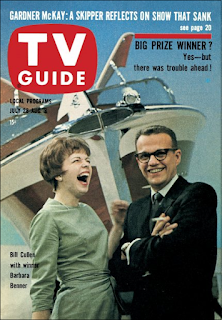 I
t's an interesting issue this week, as good as any at showing how some things have changed over time, and how hard it might be for us to appreciate what those things were like, back then. And, as is frequently the case, we turn to sports to demonstrate some of those changes.
I
t's an interesting issue this week, as good as any at showing how some things have changed over time, and how hard it might be for us to appreciate what those things were like, back then. And, as is frequently the case, we turn to sports to demonstrate some of those changes.For example, two baseball All-Star Games? Yes indeed; as sportswriter Melvin Durslag explains, for the last four years Major League Baseball has put its stars on display twice a year. Although the fans enjoy seeing baseball's best face-off to determine league supremacy, the reason behind the game has always been to fund the players' pension fund, and starting in 1959, a second game was added to boost the fund. This year's first game was played on July 10 in Washington, D.C., and the second game is scheduled for this Monday at Wrigley Field in Chicago. The managers remain the same, and with the exception of a few additional players, so are the rosters.
The twice-a-year format has gotten mixed reviews at best; while the revenue is appreciated, players are concerned about the increased possibility of injury. Fans seem to be tiring of it as well: 1960's second game, at Yankee Stadium, drew less than 40,000.* As for the future, the National League favors playing two, while the American has reservations. There seems to be a sense, though, that the days of two All-Star Games may be numbered.
*Remember that the games were still played in daytime back then. Additionally, with the departure of the Dodgers and Giants, New York really wasn't all that great a baseball town.
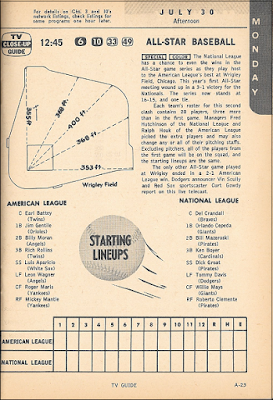 In fact, the doubters are right. After Monday's game, televised by NBC at 12:45 p.m. ET and won by the Americans 9-4, the Midsummer Classic will return to one game, where it remains to this day. And with the explosion of televised baseball and the advent of interleague play, the game seems to carry less fan interest than ever.
In fact, the doubters are right. After Monday's game, televised by NBC at 12:45 p.m. ET and won by the Americans 9-4, the Midsummer Classic will return to one game, where it remains to this day. And with the explosion of televised baseball and the advent of interleague play, the game seems to carry less fan interest than ever.t t t
The All-Star Game was created by Chicago Tribune sportswriter Arch Ward, as part of the 1933 Chicago "Century of Progress" World's Fair. Ward was the brainchild behind another all star format, one designed to benefit the Tribune charities: an annual game matching the NFL champions and a collection of all-stars from the last season's college football seniors.
Thus was born the College All-Star Game, which kicked off for the first time in 1934 and will be played for the 29th time Friday night at 9:00 p.m. on ABC, live from Soldier Field in Chicago. The concept probably sounds absurd today: pitting a team of professional champions against college seniors, no matter how good those rookies may be, gives every indication of a mismatch. And yet such was not the case for the first few years, when pro football was not yet the giant it is today, and the college game was still the more glamorous and popular of the two. The Stars more than held their own for those first years, winning six of the first 17 contests (with two ties) and often keeping the score close in the years in which they lost.
This year's game pits an all-star team led by future pro stars Roman Gabriel, John Hadl, Lance Alworth, Merlin Olson, and Heisman winner Ernie Davis against the Green Bay Packers, coming off a 37-0 destruction of the New York Giants in the 1961 NFL Championship and featuring a roster with an astounding 10 future Hall of Famers, including Bart Starr, Paul Hornung, Jim Taylor, Forrest Gregg, Ray Nitschke, Herb Adderley, Willie Davis, Jim Ringo, Willie Wood and Henry Jordan. With that kind of talent, it's no surprise that the Packers easily best the All-Stars, winning 42-20.
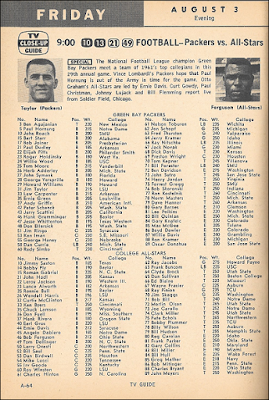 It's a microcosm of the game's future. The All-Stars will win only one more game, upsetting the same Packers the following year 20-17. And although the Stars put up surprisingly spirited games against the New York Jets in 1969 (losing 26-24), the undefeated Miami Dolphins in 1973 (a tough 14-3 struggle) and the Pittsburgh Steelers in 1975 (leading in the fourth quarter before losing 21-14), too many of the games are mismatches. The NFL has increased worries about their star rookies being injured before the beginning of the season and the players themselves voice concerns about money. After a 24-0 route of the Stars by the Steelers in 1976, in a game called in the 3rd quarter due to heavy rain, the annual matchup disappears, never to be played again.
It's a microcosm of the game's future. The All-Stars will win only one more game, upsetting the same Packers the following year 20-17. And although the Stars put up surprisingly spirited games against the New York Jets in 1969 (losing 26-24), the undefeated Miami Dolphins in 1973 (a tough 14-3 struggle) and the Pittsburgh Steelers in 1975 (leading in the fourth quarter before losing 21-14), too many of the games are mismatches. The NFL has increased worries about their star rookies being injured before the beginning of the season and the players themselves voice concerns about money. After a 24-0 route of the Stars by the Steelers in 1976, in a game called in the 3rd quarter due to heavy rain, the annual matchup disappears, never to be played again.It's too bad. As a kid I always looked forward to this game, one of the few night games on television, and on a Friday night to boot. With the exception of the years when the Packers played, I loved rooting for the underdog college stars, always hoping for that one year when they would shake up the pros. It was, between the years when the old Chicago Cardinals departed for St. Louis and when the Bears vacated Wrigley Field, the only game played at Soldier Field. It was an event, a game with its own charm and atmosphere, and its departure, like the watering down of baseball's All-Star Game, leaves something of a void in at least one sports fan's life.
t t t
One more sports note before we go on to another farewell. Or actually, I guess this could fall into that category as well. It's CBS' Saturday afternoon Game of the Week between the Chicago White Sox and New York Yankees, from Yankee Stadium. It's preceded at noon by a 90-minute broadcast of one of the Yankees' great traditions: Old Timers' Day. They still do this in New York, and it's still a great tradition though it's not carried on national television anymore, which is a pity.
Looking at the lineup for the three-inning game is like flipping through the record books: Joe DiMaggio, Lefty Grove, Hank Greenberg, Bob Feller, Jackie Robinson, Dizzy Dean. Many of these players were relatively recently retired, and so they were still able to actively participate in the game. What a treat that was, back when baseball was still the national pastime and giants still roamed the earth.
t t t
In an issue from last year , we read a profile of Gardner McKay, star of Adventures in Paradise. At the time, McKay freely admitted "I'm no real actor," and the discussion continues this week, now that his series has been cancelled. "I read a lot about my so-called 'quality,' he says. 'Let me tell you, in Hollywood when an actor is needed but not understood, it is suddenly discovered he has "quality." The minute he is no longer needed he is dismissed as a nut.'"
Although McKay sounds bitter, confused would probably be a better word for it. About the tendency of people to refer to him as an "enigma," he replies "That means perplexing, baffling, a person who talks in riddles. It's true I don't have a disciplined mind, my thoughts do tend to wander, but I have always said what I think as best I could. You know, for three years I have been castigated by the press for not saying what they want me to say. I am sick of it."
In fact, McKay—who frankly has more going for him than acting; he is also a writer, a sculptor and a photographer—is fed up with the whole Hollywood scene: "I hate television series, uniforms of any kind, agents, business, the practice of law, career women and Hollywood—which isn't really a place but a state of mind that has to be corrected if any measure of contentment is to be achieved." So why is he still around? His reply is honest and frank: "Because I don't have the guts to get out and because nobody has offered me $150,000 a year to go and search my soul elsewhere."
The Gardner McKay story has always revolved around his handsome features rather than his acting chops; Life magazine once called him "A New Apollo." Actor Herbert Marshall said, "His rare quality is being attractive to both men and women. And compared with other TV actors, his ability to act is about average." Regarding his ability, McKay complains, "Maybe I'm not the greatest actor in the world, but nobody has given me much help to improve. I had a long line of directors who were more concerned with keeping the front office happy than working with the actors. When I suggested acting lessons, I was told to forget it because it would make me even more introspective." No wonder he feels the way he does.
Soon McKay will be gone from the acting ranks completely, by his own choice. As we know from last year's piece, his second life as a novelist and playwright will be far more satisfying.
t t t
So what about this week's cover? It actually tells not one, but two stories. The first tells how being a game show host can mean big bucks for those who have the knack of "fast talk, good looks and some secret ingredients." In fact, the best in the business can pull down as much as $150,000 a year, "which seems rather high pay for simply being pleasant." But as Mark Goodson, one of the major domos of Goodson-Todman, remarks, the game show host—or emcee, as they prefer to be known—hase to have specific qualities: he must be a talker, one who can "keep right on talking for as long as he has to—and enjoy it." He has to be able to listen, rather than simply think about what they're going to do next; Goodson sites the story of an emcee who asked a woman what her husband did, was told that he was dead, and responded with a hearty "Fine!" He also has to be friendly, and be able to communicate it genuinely to both contestants and viewers at home. Then there are the secondary qualities such as timing, thinking quickly on his feet, and being a good "traffic cop."
 The second article tells the story of Barbara Benner, who as a contestant on Bill Cullen's The Price Is Right won nearly $14,000 in prizes. And at first it was pretty thrilling, until reality set in. Her haul included a 21-foot Century Coronado worth $7,624, but that was the first to go: "We couldn't afford the insurance and we couldn't even get down to the shore often enough to use it." Next to go was a dining room breakfront valued at $1,500; "it's Early American. I have Danish modern." She won 23 pieces of garden furniture, but only has room for a few pieces; she also scored with 1500 cartons of Sealtest lemonade and 100 4-pound bolognas and a giant barbecue ($1,380)—her comment on that was "who on earth needs to roast 40 chickens at a time?" She had to sell that as well.
The second article tells the story of Barbara Benner, who as a contestant on Bill Cullen's The Price Is Right won nearly $14,000 in prizes. And at first it was pretty thrilling, until reality set in. Her haul included a 21-foot Century Coronado worth $7,624, but that was the first to go: "We couldn't afford the insurance and we couldn't even get down to the shore often enough to use it." Next to go was a dining room breakfront valued at $1,500; "it's Early American. I have Danish modern." She won 23 pieces of garden furniture, but only has room for a few pieces; she also scored with 1500 cartons of Sealtest lemonade and 100 4-pound bolognas and a giant barbecue ($1,380)—her comment on that was "who on earth needs to roast 40 chickens at a time?" She had to sell that as well.What is the result of Barbara Benner's big win on Price? So far, she's sold the boat, barbecue, lawn furniture and a set of Royal Worcester china; the breakfront hasn't had any takers yet. Sealtest gave her a $100 credit on her milk bill and paid her $200 for the lemonade, and her sister helped sell the bologna for $180. All in all, she's made $7,130 from her winnings, a little over half of their worth. But that's actually good news: "Out of the boat money, we got enough to pay all the taxes" on the prizes, and she and her husband were able to purchase a couple of modest cars, an electric dryer, some clothes, and some nice dinners. They'll wind up with about $1,000 in the bank, and hope some day to take a cruise.
The lesson then, as now, is that not all is what it seems on game shows. Paying tax on your prizes means many people have to sell some or all of their winnings, and unless you've got a cooperative prize supplier (which many are, nowadays), you might find all that glitters is not gold.
t t t
There are some very good movies on the tube this week; let's take a look at some of them, along with the rest of the week's highlights.
On Saturday, Indianapolis' WLW-i, Channel 13, has The Thin Man (midnight), the classic comedy-mystery starring William Powell and Myrna Loy as Nick and Nora Charles. It's the first of six in the series, and in many ways the best. Incidentally, for those of you who haven't seen it, the "Thin Man" is not William Powell's Nick, but the victim of the movie's central murder. It's a wonderfully fun movie, and it will make you jealous that you can't come up with quips as quickly as these characters can.
Sunday, ABC's Hollywood Special movie is the Agatha Christie mystery Witness for the Prosecution (8:30 p.m.), with a magnificent cast including Charles Laughton (who received his final Oscar nomination for the role), Tyrone Power, Marlene Dietrich and Elsa Lanchester. Perry Mason notwithstanding, this is the courtroom drama against which all others are measured.
We're in that period of limbo between the time Jack Paar left The Tonight Show and Johnny Carson took over, so the show's featured guest hosts until Carson's October 1 start date. On Monday (11:20 p.m.), Merv Griffin is back for the week, his second stint as host; I've heard that NBC brass, aware of the critical praise for Griffin's shows and nervous about Carson's ability to keep the audience, seriously debated going with Merv before sticking with Johnny. Don't know whether or not that's true, but in any event I don't think they had anything to worry about. He's going head-to-head against Steve Allen's syndicated talker, positioned to take advantage of any stumble Carson might make as host of Tonight.
On Tuesday, CBS presents a repeat of "Carnegie Hall Salutes Jack Benny" (9:00 p.m.), a special from last year. Benny's violin playing was a running joke, but he could actually play—not spectacularly, but certainly better than I can. It's a salute because of the money Benny has raised in benefit concerts for musicians, and also because of the work he and friend Isaac Stern did to save Carnegie from Robert Moses' wrecking ball. Fittingly, Stern is one of the guests on the show, along with Benny Goodman and his sextet, pianist Van Cliburn, opera star Roberta Peters, and conductor Eugene Ormandy leading the Philadelphia Orchestra. What a lineup! Here's an excerpt:
Armstrong Circle Theater was different from other dramatic anthology series of the time in that it tended to focus on docudramas and other stories having to do with current events. This Wednesday's show (10:00 p.m.) is no exception, as Arthur Hill and Lydia Bruce star in "Battle of Hearts," a story of how marriage counselors work to save marriages from ending in divorce. The series is hosted by Ron Cochran, who's also the anchor of the ABC Evening News.
It's movie time again on Thursday, with Indianapolis' WTTV showing the John Wayne classic She Wore a Yellow Ribbon st 10:00 p.m. Up against that, CBS presents a unique news special—a one-hour discussion between two of the great writers of the era, Pulitzer Prize winners and old friends Archibald MacLeish and Mark Van Doren.* What a discussion that must have been.
*Fun facts: MacLeish, according to the always-reliable Wikipedia, is the great-uncle of Bruce Dern, which makes him great-great-uncle to Laura Dern. Van Doren's son, Charles Van Doren, achieved a sizable amount of television fame for reasons we all know.
Finally, the end of the week, and Friday's best, other than the All-Star Game, might well be the CBS western Rawhide (7:30 p.m.), which at this point still stars Eric Fleming as trail boss Gil Favor, but the real star of the show is Rowdy Yates, best-known for bringing to prominence one Clint Eastwood. You probably knew that, though. The theme song was also pretty well-known, but then you probably knew that too. TV
Published on July 27, 2019 05:00
July 26, 2019
Around the dial
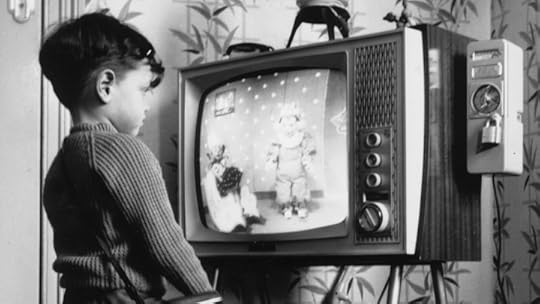 As is the case from time to time, allow me to borrow this space for a brief announcement before we get to the good stuff. In the last couple of weeks, I've had two or three people ask me if I was going to be following up on
last year's successful presentation
at this year's Mid Atlantic Nostalgia Convention. It would be nice to say that the answer to this is affirmative; it would be nice, but it wouldn't be true. Due to our current financial situation (which is exacerbated by both of us being temporarily unemployed), we aren't doing much of anything at present, from buying TV Guides to flying to Baltimore. After all, when one is just trying to pay the bills, it is prudent to keep those bills to the bare minimum. (At least that's what the fortune cookie said.) I'm planning to be back next year—hopefully, things will have improved by then—but in the meantime, you all will have to fill me in on what happens. Seriously; if you take pictures, please share them here!
As is the case from time to time, allow me to borrow this space for a brief announcement before we get to the good stuff. In the last couple of weeks, I've had two or three people ask me if I was going to be following up on
last year's successful presentation
at this year's Mid Atlantic Nostalgia Convention. It would be nice to say that the answer to this is affirmative; it would be nice, but it wouldn't be true. Due to our current financial situation (which is exacerbated by both of us being temporarily unemployed), we aren't doing much of anything at present, from buying TV Guides to flying to Baltimore. After all, when one is just trying to pay the bills, it is prudent to keep those bills to the bare minimum. (At least that's what the fortune cookie said.) I'm planning to be back next year—hopefully, things will have improved by then—but in the meantime, you all will have to fill me in on what happens. Seriously; if you take pictures, please share them here!Now to our regular programming.
At Classic Film and TV Cafe, Rick reminds us of the good old days when Davy Crockett was a regular feature on ABC's Disneyland . You know, back when the news out of the Disney camp was a little more wholesome than it is today.
Fire-Breathing Dimetrodon Time continues to look at the underrated series The Adventures of Brisco County, Jr. I was going to say that this show was ahead of its time, but it really wasn't; it's more like The Wild Wild West, which was on, what, almost 30 years earlier?
At Garroway at Large, Jodie discusses CBS's streaming of the Apollo 11 mission this week (something that I enjoyed as immensely as she did), and how it would make the researcher's job much easier if more networks were as generous with their archives .
Besides making kind mention of The Electronic Mirror, David's latest at Comfort TV is a very nice appreciation of what he calls " looking beyond the frame ," at the things we never see in our favorite TV shows—from the places we don't go to, to the ordinary events of an uneventful day.
Television's New Frontier: the 1960s moves to the 1961 season of Mr. Magoo . I've always had a fondness for the Magoo character, especially in the wonderful adaptation of A Christmas Carol a few years later, but as the author points out, it does tend to be something of a one-trick pony.
You won't want to miss this week's TV Guide flashback at Television Obscurities, but while you're there, take time to check out the other features, including a great look back at the first issue of the Garrison's Gorillas comic book !
For some reason, I've had the old DuMont network on my mind lately (one failing enterprise to another?), so naturally I was drawn to Andrew's post at The Lucky Strike Papers about his mother's appearances on DuMont shows back in 1949. A shame that network didn't survive.
Finally, at Classic Television Showbiz, Kliph Nesteroff has part seven of his long-form interview with the late Paul Krassner , who talks about (among other things) his appearance on The Merv Griffin Show while he was high on mescaline. TV
Published on July 26, 2019 05:00
July 24, 2019
"Coronet Blue" and the mysterious world of the amnesiac
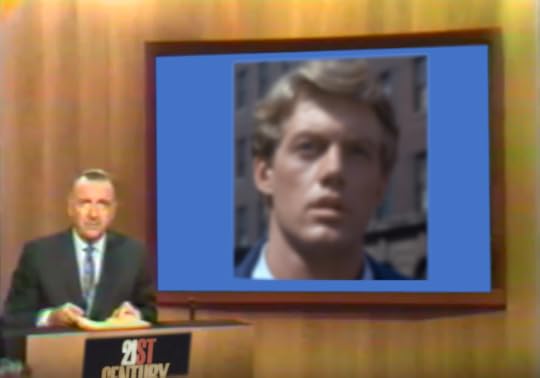 He calls himself 'Michael Alden,' but says that this is not his name. He claims not to know his real name, nor who he is, nor anything that happened to him up until two months ago. Tonight we explore the mystery that is amnesia—the loss of a person's memory, and with it, the loss of his humanity as well. I'm Walter Cronkite, and this is The 21st Century."
He calls himself 'Michael Alden,' but says that this is not his name. He claims not to know his real name, nor who he is, nor anything that happened to him up until two months ago. Tonight we explore the mystery that is amnesia—the loss of a person's memory, and with it, the loss of his humanity as well. I'm Walter Cronkite, and this is The 21st Century."t t t
Obviously, this never happened. As classic TV fans know, "Michael Alden" is the character played by Frank Converse in the cult classic series, Coronet Blue. And, as our ersatz Walter Cronkite says, Michael Alden has amnesia. He was dragged half dead out of the water, murmuring the words "Coronet Blue." He has no idea what this means, nor about anything else that has happened to him up until the time he is rescued. He doesn't even know his own name; he picks the name Michael Alden because it's a combination of his doctor's first name and the name of the hospital where he was treated. For the remaining thirteen episodes, Alden will search for clues as to his real identity, and what "Coronet Blue" really means—while the people who tried to kill him look to finish the job.
It's a great idea for a television series, and had Coronet Blue existed in the real world (as is the case with many TV shows today), it's quite likely that Alden would have been an ideal subject for a science program like The 21st Century (which aired on CBS from 1967-1970; it's predecessor, The 20th Century, began in 1957). But just how plausible is the idea behind Coronet Blue? And how realistic is pop culture's depiction of amnesia?
t t t
What do we know about Michael Alden? Not much. As Coronet Blue opens, he’s onboard a ship, one piece in a moving puzzle. It’s clear that he’s part of some kind of plot; a heist, perhaps, or some kind of undercover operation—we just don’t know. Quickly, it becomes apparent that something’s gone wrong, that his confederates have discovered something about him—he had ratted them out, he wasn’t who he claimed to be, something like that—and consequently he’s been targeted for death. There’s a struggle, he goes over the rail of the ship and into the water, the bad guys take a couple of shots at him (or are they good guys? We just don’t know), and after a time he’s dragged ashore, nearly dead, mumbling the words “coronet blue.” He recovers, physically. Mentally, however, he’s a mess. He doesn’t know who he is, how he got there, why someone would want to kill him, and he has no idea what “coronet blue” means. Michael Alden has amnesia.
In pop culture, the situation most like Alden’s is probably that of Jason Bourne, the character played by Matt Damon in the Bourne movies. Like Alden, Bourne is pulled out of the water after someone has tried to kill him; like Alden, he has no memory of his identity, although he retains his language and motor skills.
Both Alden and Bourne suffer from a type of psychogenic dissociative amnesia called “retrograde” amnesia. As opposed to "anterograde" amnesia, which affects the ability of the mind to form new memories, retrograde amnesia means the inability to recall things that happened before a specific date, usually the date of an accident or trauma. In both of these cases, we see how retrograde amnesia “tends to negatively affect episodic, autobiographical, and declarative memory while usually keeping procedural memory intact with no difficulty for learning new knowledge.”
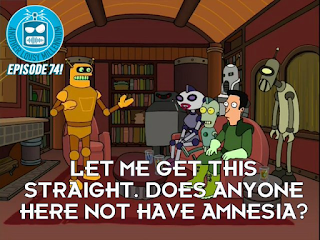 Now, within this fairly broad diagnosis, there are two subsets which we could be dealing with. The first, “situation-specific” amnesia, sometimes called “suppressed memory,” means that memory loss is confined to a specific traumatic event, with the victim able to remember things that happened both before and after the event. In the Twilight Zone episode “Nightmare as a Child,” for example, Janice Rule plays Helen Foley, a woman who unknowingly suffers from such a condition: Helen has no memory of her mother’s murder, nor that the young Helen was a witness to the murder, until the appearance of a little girl (Helen when she was young; an apparition? A manifestation of her subconscious? It is the Twilight Zone, after all) brings her memory back in time to apprehend the murderer, who’s returned to eliminate the only witness—Helen.* That’s an example of “situation-specific” amnesia.
Now, within this fairly broad diagnosis, there are two subsets which we could be dealing with. The first, “situation-specific” amnesia, sometimes called “suppressed memory,” means that memory loss is confined to a specific traumatic event, with the victim able to remember things that happened both before and after the event. In the Twilight Zone episode “Nightmare as a Child,” for example, Janice Rule plays Helen Foley, a woman who unknowingly suffers from such a condition: Helen has no memory of her mother’s murder, nor that the young Helen was a witness to the murder, until the appearance of a little girl (Helen when she was young; an apparition? A manifestation of her subconscious? It is the Twilight Zone, after all) brings her memory back in time to apprehend the murderer, who’s returned to eliminate the only witness—Helen.* That’s an example of “situation-specific” amnesia.*The moral of the story being, at least if you’re a murderer, that it’s best to leave well-enough alone.
However, Alden’s amnesia appears more likely to be a type known as “global-transient”; in other words, a major gap in the part of the memory that relates to personal identity. The most common illustration of global-transient amnesia is a “fugue state,” in which there is “a sudden retrograde loss of autobiographical memory resulting in impairment of personal identity and usually accompanied by a period of wandering.” That last is significant, because the premise of Coronet Blue is built around Alden’s attempts to find out who he is, resulting in travelling—wandering—to different parts of the country, searching for anyone or anything that can help him discover who he is. And what coronet blue means, of course.
It’s likely that Alden’s doctors would have checked for some type of brain damage or other organic cause of his amnesia; they didn’t find anything, but even with today’s advancements in medical science, it’s unlikely that his amnesia was caused by anything as mundane as the proverbial “bump on the head.” Most of the time, psychogenic amnesia is traceable back to some type of psychological trigger; with Alden, it’s almost certainly related to the attack on him at the beginning of the first episode.
I wonder, though: does he really want to remember? Or is it fear—fear of what he doesn’t know—that keeps his memory from returning? All the time, though, he remains focused on “coronet blue,” and it’s not just because the theme keeps playing in the background. Find out the meaning, he knows, and it’s likely he’ll be able to unlock the mystery.
That fear of finding out what his past might be, though—that leads us to an obvious question: is Alden’s amnesia genuine? Is he a reliable narrator, or is he withholding something from the viewers?
t t t
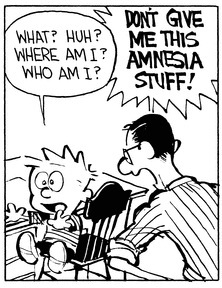 There are at least four episodes from the great legal drama Perry Mason that deal with amnesia. The first season episodes "The Case of the Crooked Candle," and "The Case of the Desperate Daughter," the fifth season episode "The Case of the Glamorous Ghost," and the seventh season episode "The Case of the Nervous Neighbor" all involve Perry dealing with someone—generally a woman—claiming some form of amnesia.
There are at least four episodes from the great legal drama Perry Mason that deal with amnesia. The first season episodes "The Case of the Crooked Candle," and "The Case of the Desperate Daughter," the fifth season episode "The Case of the Glamorous Ghost," and the seventh season episode "The Case of the Nervous Neighbor" all involve Perry dealing with someone—generally a woman—claiming some form of amnesia.Is there a significance in this gender distinction? Possibly. While there's no particular evidence to suggest that women are more susceptible than men to amnesia, the victim in "Glamorous Ghost," Eleanor Corbin, claims to be suffering from amnesia "after police find her running and screaming through woods near her apartment building." Doubtless someone would have referred to Eleanor as being "hysterical." And that term, as understood and applied to women, dates back over 4,000 years. The National Center for Biotechnology Information calls hysteria "the first mental disorder attributable to women, accurately described in the second millennium BC, and until Freud considered an exclusively female disease."
Therefore, with Eleanor displaying no signs of physical injury, the suggestion is that her amnesia is a form of retrograde amnesia known as "hysterical reaction," one that does not appear to depend upon an actual brain disorder. Perry accepts this diagnosis, at least insofar as it provides him with the opportunity to stall for time while he tries to assemble the facts. The police, however, are suspicious: and for good reason, as Encyclopaedia Britannica notes darkly: "Although most dramatic, such cases are extremely rare and seldom wholly convincing."
In fact, malingering—that is, the rational output of a neurologically normal brain aiming at the surreptitious achievement of a well identified gain—is a constant threat in such cases. It's understandable, then, that law enforcement officials have long been leery about such diagnoses, and for years they’ve pushed for some kind of standardized test for amnesia. Unlike the M'Naghten rule, which tests for criminal insanity, judging the legitimacy of amnesia claims defies application of uniform standards. As one expert remarks, amnesia cases “differ in onset, duration, and content forgotten” to the extent that it cannot be broadly defined in legal circumstances. And in a landmark case in England in 1959, a jury was called on to determine whether a defendant was faking amnesia, making him legally unfit to stand trial. The jury ruled he was faking (and convicted him, to boot). In truth, most cases of psychogenic retrograde autobiographical amnesia resolve themselves on their own accord, so if Hamilton Burger is willing to be patient, he might well be able to wait his suspect out. And, in fact, Eleanor Corbin is faking her amnesia, a deception which is soon uncovered by the police.* Could Michael Alden be doing the same thing?
*Don't worry; Perry wins, in spite of his client—which is frequently the case.
The police were, it appears, suspicious of his claim; however, that suspicion was mitigated by the fact that he wasn't accused of having committed any crime. Indeed, the only crime apparent seems to have been perpetrated against him. But if he is faking it, it's reasonable to assume that the reason goes back to that mysterious scene at the beginning of the series. Which means that there's something in his past he's trying to hide, something very dark indeed. And he knows full well what it is.
t t t
 Even a series as reliable as The Fugitive has an amnesia episode. It's the ninth episode of the second season, "Escape into Black," in which Dr. Richard Kimble is caught in an explosion at a diner. He awakens in a hospital, badly injured, and with no idea who he is or what has happened to him. Fortunately, there's a social worker on the scene, one determined to look out for Kimble's interests even though he can't look out for them himself. Learning that Kimble had been asking about a one-armed man prior to the explosion, she renews the search herself. A good thing, too, because Kimble, having found out he's wanted for murder and with no idea of whether or not he's guilty, is on the verge of surrendering himself to Lt. Gerard.
Even a series as reliable as The Fugitive has an amnesia episode. It's the ninth episode of the second season, "Escape into Black," in which Dr. Richard Kimble is caught in an explosion at a diner. He awakens in a hospital, badly injured, and with no idea who he is or what has happened to him. Fortunately, there's a social worker on the scene, one determined to look out for Kimble's interests even though he can't look out for them himself. Learning that Kimble had been asking about a one-armed man prior to the explosion, she renews the search herself. A good thing, too, because Kimble, having found out he's wanted for murder and with no idea of whether or not he's guilty, is on the verge of surrendering himself to Lt. Gerard.We know how it ends, of course: Kimble regains his memory in time to escape Gerard and resume his search for the one-armed man. It's mighty convenient for us all that his problem clears up before the episode ends—but how likely is it?
Well, it's at least plausible. That same article from the Encyclopaedia Britannica notes that retrograde amnesia cases "usually clear up with relative rapidity, with or without psychotherapy." Once Michael Alden's doctors make their diagnosis (which, although it’s not mentioned by name, is almost certainly psychogenic retrograde autobiographical amnesia), then comes the treatment. Or at least it would, if Alden was willing to stand still for it. But he’s still running for his life, remember, and he realizes that he can’t afford to sit around undergoing extensive therapy to try and recover his memory. While that’s happening, the killers could catch up to him again, and this time they might not miss. (They could keep him in the hospital, of course, but then who knows if his insurance covers it, or even if he has insurance? It’s not as if they can look him up.) The treatment, however, would almost certainly have been a course of psychological therapy. Now, in the early decades of the 20th century, the therapy might have consisted of “truth serum” drugs such as barbiturates and benzodiazepines, and doubtless there are those who might wonder why his doctors didn’t try that. In fact, however, those drugs weren’t very successful in dealing with cases of amnesia—while they did make it possible for the patient to speak more easily about things, they also lowered the threshold of suggestibility, with the result that the information from the patient lacked reliability. By the 1960s, that kind of treatment would have been out.
It’s far more likely that a course of psychoanalysis would be suggested, and I think it’s intriguing that one of the possible diagnoses to come from such treatment would have been along Freudian lines, by suggesting that his amnesia was a form of self-punishment, “with the obliteration of personal identity as an alternative to suicide.” I wonder if that will come up in the course of the series? Is it possible that Alden’s apparent dual identity at the start of the series has to do with something so secretive, so horrifying, that his subconscious simply can’t deal with it anymore, with the result that he tries to sweep it all clean? In an early episode, someone shrewdly observes that he has an opportunity few people ever get: to make a brand-new start to life, with no baggage, nothing linking him to the past. Is that what he’s subconsciously trying to do, to divorce himself from something he doesn’t want to be reminded of? In such conversations, Alden invariably states that all he’s interested in is the truth of who he is, and if it turns out that there’s something bad in his past (in one episode, he thinks he might be a killer), well, so be it—that’s the risk he’s willing to take.
t t t
 And this, Walter Cronkite would probably discover, is where the story ends. In cases involving brain damage, doctors may be able to find a cause, and perhaps a cure. But Michael Alden's case remains a mystery. It is likely, but not certain, that his amnesia will eventually clear up. It may happen relatively quickly, or it may take a protracted period of psychoanalysis. But as to how or why it happens, and how or why it resolves itself? And what the amnesiac goes through, a man without a past, whose continued survival depends on reclaiming that past? It is, surely, part of the mysterious world of the amnesiac. One thing is for certain, however: the trauma that Michael Alden faces is one that most of us will never have to deal with.
And this, Walter Cronkite would probably discover, is where the story ends. In cases involving brain damage, doctors may be able to find a cause, and perhaps a cure. But Michael Alden's case remains a mystery. It is likely, but not certain, that his amnesia will eventually clear up. It may happen relatively quickly, or it may take a protracted period of psychoanalysis. But as to how or why it happens, and how or why it resolves itself? And what the amnesiac goes through, a man without a past, whose continued survival depends on reclaiming that past? It is, surely, part of the mysterious world of the amnesiac. One thing is for certain, however: the trauma that Michael Alden faces is one that most of us will never have to deal with.There is, however, another kind of amnesia, one which probably would not have been covered on The 21st Century, but which would certainly be included on any contemporary science show dealing with the memory. And, unlike that portrayed on Coronet Blue, this one is fickle and pernicious, and it strikes with impunity.
Dementia. Alzheimer's.
Wendy Suzuki, a professor of neural science and psychology in the Center for Neural Science at New York University, hosts a popular podcast at Live Science. Back in 2005, she did an episode with her friend and colleague Neal Cohen, a professor at the University of Illinois, Champaign-Urbana, The topic: amnesia in pop culture. The emphasis is on movies rather than television, though their discussion of the Bourne movies is reflected in our discussion here. (If you're looking for realistic portrayals of amnesia, don't bother with 50 First Dates; check out Memento instead.)
I suppose you could call Alzheimer's a form of retrograde amnesia, although it works backwards, wiping the most recent memories first while leaving the oldest intact until the end. It's mostly anterograde, though: unlike Michael Alden, there will be no new memories for someone suffering from dementia, for those new memories will simply disappear. And there is no hope that the situation will resolve itself.
One of the realizations that comes from this awareness, Suzuki says, is that at the end of the day, the only thing you have for certain is the present, the knowledge that you have to live fully in the moment. If you can’t remember all the details, at least you can be content that at the moment you were 100% there.
My current "present" consists of a months-long struggle to find permanent employment, while contending with various aches and pains, and observing a culture and a world that seems bent on total self-destruction. While it would be wrong to say that these things have dominated every waking moment of my life, it makes the prospect of living in this present a profoundly depressing one. As Peggy Lee might ask, if this is all there is. . . The thought of being fully present in this life, with no past, no future, nothing at all but what is right here and right now—well, that falls somewhere between terrifying and unbearable. Pray God, it ends soon, because nobody wants to be 100% here.
Yet it could be my future, or yours, or anyone out there. Not simply from fate, or bad decisions, but because it's something that strikes at you, and tears at you, until there's literally nothing left.
Don't wait; that should be the moral of the story. Do your living now, while you can, while you can still live in the present. That's what Michael Alden does, in Coronet Blue. He does it because he has no choice. And really, neither do we. Life is not meant for inertia, but for movement. Forward movement. However you can, wherever you can, whenever you can. Even if you're not like Michael Alden.
But we have a couple of advantages over Mike: for one thing, he doesn't know who's shooting at him, but we know who's shooting at us. Life is firing the bullets, and the one thing of which we can be certain is that one of them, somewhere, has your name on it, and another one has mine. For another, most of us don't have to worry about our series being cancelled before we find out the answers.
There's only one problem with this analogy, of course. We don't know what "coronet blue" means either. TV
A note before you comment: Yes, I know that Larry Cohen, the show's creator, has since explained what "coronet blue" means and who Michael Alden really is. But if you know that, please don't discuss it in the comments section. The show's available on DVD and Blu, and I don't want it spoiled for anyone yet to see the series. This means you!
Published on July 24, 2019 05:00
July 22, 2019
What's on TV? Thursday, July 26, 1956
 Idon't know how it is that I got a supply of TV Guides from Ohio, although I suspect I must have at one time or another purchased them from the same vendor. Anyway, 1956 is one of the older issues we've looked at, and you can see a lot of movement in the affiliations; we even have a couple of stations that bill themselves as being part of DuMont, although that network will cease to operate next month, and in fact even now the only regular programming they offer is boxing. We don't see that tonight, so it's up to the three networks to entertain us. Let's see how well they do.
Idon't know how it is that I got a supply of TV Guides from Ohio, although I suspect I must have at one time or another purchased them from the same vendor. Anyway, 1956 is one of the older issues we've looked at, and you can see a lot of movement in the affiliations; we even have a couple of stations that bill themselves as being part of DuMont, although that network will cease to operate next month, and in fact even now the only regular programming they offer is boxing. We don't see that tonight, so it's up to the three networks to entertain us. Let's see how well they do.2 WLW-D (DAYTON) (NBC, ABC)
MORNING
6:55 Inspiration—Religion
7:00 Today—Garroway
7:25 NEWS
7:30 Today—Garroway
7:55 NEWS
8:00 Today—Garroway
8:25 NEWS —Al Herbert
8:30 Today—Garroway
8:55 Five Minutes to Live By
9:00 Ding Dong School
9:30 Romper Room—Miss Jean
9:55 NEWS—Al Herbert
10:00 Home—Francis
11:00 Feather Your Nest 11:30 It Could Be You
AFTERNOON
12:00 50-50 Club—Lyons
12:30 Weather—Jim Fidler
12:35 50-50 Club—Lyons
1:30 Tennessee Ernie
2:00 Matinee Theater COLOR “Letter of Introduction”
3:00 Queen for a Day
3:45 Modern Romances
4:00 So This Is Hollywood
4:30 Channel 2 Presents
5:00 Mickey Mouse Club
EVENING
6:00 Sally Flowers—Variety
6:30 Snooky Lanson
6:45 NEWS—Swayze
7:00 TOPPER—Comedy
7:30 CRUNCH AND DES
8:00 PEOPLE’S CHOICE
8:30 FORD THEATRE
9:00 LUX VIDEO THEATRE COLOR
10:00 GROUCHO MARX
10:30 DRAGNET—Webb
11:00 NEWS
11:15 Walter Phillips
11:30 Phillips in the Dark
12:00 Tonight—Allen
4 WLW-C (COLUMBUS) (NBC)
MORNING
6:45 Forecast for Today
7:00 Today—Garroway
7:25 NEWS
7:30 Today—Garroway
7:55 NEWS
8:00 Today—Garroway
8:25 Five Minutes to Live By
8:30 Today—Garroway
8:55 NEWS
9:00 Ding Dong School
9:30 Ernie Kovacs—Variety
10:00 Home—Francis
11:00 Feather Your Nest 11:30 It Could Be You
AFTERNOON
12:00 50-50 Club—Lyons
12:30 Weather—Jim Fidler
12:35 50-50 Club—Lyons
1:30 Tennessee Ernie
2:00 Matinee Theater COLOR “Letter of Introduction”
3:00 Queen for a Day
3:45 Modern Romances
4:00 So This Is Hollywood
4:30 Notes and Notions—Cooke
5:00 MOVIE—Adventure Theater Five: “Rocky”
EVENING
6:00 Sally Flowers—Variety
6:30 Snooky Lanson
6:45 NEWS—Swayze
7:00 THE BIG BEAR HUNT—Crum
7:15 NEWS—John Deegan
7:30 STAR STAGE—Drama
8:00 PEOPLE’S CHOICE
8:30 FORD THEATRE
9:00 LUX VIDEO THEATRE COLOR
10:00 GROUCHO MARX
10:30 DRAGNET—Webb
11:00 NEWS
11:15 Broad and High—Hindman
11:30 Phillips in the Dark
12:00 Tonight—Allen
1:00 NEWS—Bill Hindman
5 WLW-T (CINCINNATI) (NBC)
MORNING
7:00 Today—Garroway
7:25 Weather—Tony Sands
7:30 Today—Garroway
7:55 Cincinnati Today
8:00 Today—Garroway
8:25 Five Minutes to Live By
8:30 Today—Garroway
8:55 Five Minutes to Live By
9:00 Ding Dong School
9:30 Ernie Kovacs—Variety
10:00 Home—Francis
11:00 Feather Your Nest 11:30 It Could Be You
AFTERNOON
12:00 50-50 Club—Lyons
12:30 Weather—Jim Fidler
12:35 50-50 Club—Lyons
1:30 Tennessee Ernie
2:00 Matinee Theater COLOR “Letter of Introduction”
3:00 Queen for a Day
3:30 Take It Easy—Paul Dixon
4:30 Films at Four-Thirty
5:00 MOVIE—Western Headin’ West: “Ridin’ on a Rainbow”
EVENING
6:00 Range Rider—Western
6:30 Snooky Lanson
6:45 NEWS—Swayze
7:00 NEWS—Grand and Wilson
7:10 WEATHER—Tony Sands
7:15 RUBY WRIGHT—Songs
7:30 STAR STAGE—Drama
8:00 HIGHWAY PATROL—Police
8:30 FORD THEATRE
9:00 LUX VIDEO THEATRE COLOR
10:00 GROUCHO MARX
10:30 DRAGNET—Webb
11:00 NEWS
11:15 Walter Phillips
11:30 Phillips in the Dark
12:00 Tonight—Allen
6 WTVN (COLUMBUS) (ABC)
MORNING
8:50 NEWS—Nuzum
9:00 Romper Room—Miss Lois
10:00 MOVIE—Variety ‘Tovarich”
11:15 Love of Life—Serial 11:30 Play Yard—Kids
AFTERNOON
12:00 Valiant Lady—Serial
12:15 NEWS—Earl Green
12:30 MOVIE—Comedy Midday Movie: “Strange Alibi”
2:00 Spook Beckman—Variety
3:00 Casper Capers—Kids
3:50 Play Klub—Kits
4:00 Gene’s Canteen—Kids
4:55 Les Paul and Mary Ford
5:00 Mickey Mouse Club
EVENING
6:00 Sheena—Adventure
6:30 Lone Ranger—Western
7:00 MOVIE—Mystery Charlie Chan Theater: “Charlie Chan at Treasure Island”
8:00 STAR TONIGHT—Drama
8:30 OUTDOOR GUIDE—Thomas
9:00 CAPTURED—Police
9:30 MOVIE—Comedy Early Home Theater “Angles Wash Their Faces”
11:00 NEWS
11:10 SPORTS—Joe Hill
11:15 Les Paul and Mary Ford
11:20 MOVIE—Drama Home Theater: “Little Caesar”
7 WHIO (DAYTON) (CBS, Du M.)
MORNING
8:00 Capt. Kangaroo—Kids
8:55 NEWS
9:00 Of All Things DEBUT
9:30 Godfrey
10:30 Strike it Rich—Quiz
11:00 Valiant Lady—Serial
11:15 Love of Life—Serial 11:30 Search for Tomorrow
11:45 Guiding Light
AFTERNOON
12:00 NEWS—Collingwood
12:10 Stand Up and Be Counted
12:30 As the World Turns
1:00 Johnny Carson
1:30 House Party
2:00 Big Payoff—Quiz
2:30 Bob Crosby—Music
3:00 Heart of the City—Drama
3:30 Famous Playhouse
4:00 King’s Crossroad—Drama
4:30 Tic Tac Toy Shop—Kids
5:00 MOVIE—Western Wild West Show: “Pals of the Saddle”
EVENING
6:00 Little Rascals—Kids
6:30 Sgt. Preston-Adventure
7:00 BOB CUMMINGS
7:30 CLIMAX!—Drama
8:30 FOUR STAR PLAYHOUSE—Drama
9:00 ARTHUR MURRAY Guest: Red Schoendienst, Duke Snider, Carl Erskine, Sal Maglie
9:30 JOE AND MABEL
10:00 NEWS—Don Wayne
10:15 THEATER TONIGHT—Drama
10:30 TO BE ANNOUNCED
11:00 NEWS
11:10 SPORTS—Charlie Hinkle
11:15 Weather—Ted Ryan
11:20 I’m the Law—Police
11:50 MOVIE—Comedy Evening Theater: “Ticket to Paradise”
9 WCPO (CINCINNATI) (ABC, Du M.)
MORNING
7:00 Know Your Word
7:20 Prayer—Religion
7:25 Farm News
7:30 Cartoon Capers—Kids
8:00 Breakfast Show—Chase
8:55 Al Lewis—Kids
10:00 Colin Callin’—Kids
10:30 Cornhuskers—Music
11:00 Al Lewis—Kids
AFTERNOON
12:00 MOVIE—Mystery Movie Matinee:“Dark Secret” (English; 1950)
1:00 Al and Wanda Lewis
2:00 Afternoon Film Festival “They Were Not Divided” (English; 1952) TV Debut
4:00 Our Gang Comedy—Kids
5:00 Mickey Mouse Club
EVENING
6:00 SPORTS—Jack Drees
6:15 NEWS—John Daly
6:30 Lone Ranger—Western
7:00 HOUR GLASS—Movie “Something Money Can’t Buy” (English; 1952)
8:00 STAR TONIGHT—Drama
8:30 MOVIE—To Be Announced
10:00 PANTOMIME HIT PARADE
11:00 MOVIE—Drama Hollywood Theater: “The Years Between” (English)
12:30 NEWS
10 WBNS (COLUMBUS) (CBS)
MORNING
8:00 Capt. Kangaroo-Kids
8:55 Slimnastics—Exercise
9:00 Of All Things DEBUT
9:30 Godfrey
10:30 Strike it Rich—Quiz
11:00 My Little Margie—Comedy 11:30 Search for Tomorrow
11:45 Guiding Light
AFTERNOON
12:00 NEWS—Dean Boyer
12:10 Weather—Bob McMaster
12:20 Farm Time—Bill ZIpf
12:30 As the World Turns
1:00 Kitchen Fair—Cooking
1:30 House Party
2:00 Touring the Town
2:30 Bob Crosby—Music
3:00 Brighter Day—Serial
3:15 Secret Storm
3:30 Edge of Night—Serial
4:00 Aunt Fran—Kids
4:25 Little Rascals—Kids
4:40 MOVIE—Western Western Roundup: “El Rancho Grande”
5:45 NEWS—Douglas Edwards
EVENING
6:00 Annie Oakley—Western
6:30 NEWS—Bill Pepper
6:50 SPORTS—Earl Flora
7:00 BOB CUMMINGS
7:30 CLIMAX!—Drama
8:30 FOUR STAR PLAYHOUSE—Drama
9:00 ARTHUR MURRAY Guest: Red Schoendienst, Duke Snider, Carl Erskine, Sal Maglie
9:30 PLAYHOUSE OF STARS
10:00 NEWS—Chet Long
10:15 CRUNCH AND DES
10:45 MOVIE—Drama Armchair Theater: “Crime Takes a Holliday”
12 WKRC (CINCINNATI) (CBS)
MORNING
7:00 Capt. Kangaroo—Kids
7:55 Jellybean Acres—Kids
9:00 Of All Things DEBUT
9:30 Godfrey
10:30 Strike it Rich—Quiz
11:00 Valiant Lady—Serial
11:15 Love of Life—Serial 11:30 Search for Tomorrow
11:45 Guiding Light
AFTERNOON
12:00 My Little Margie—Comedy
12:30 As the World Turns
1:00 Johnny Carson
1:30 House Party
2:00 Big Payoff—Quiz
2:30 Bob Crosby—Music
3:00 Brighter Day—Serial
3:15 Secret Storm
3:30 Edge of Night—Serial
4:00 Matinee Film—Drama
4:30 MOVIE—Drama Ladies’ Home Theater: “The Crooked Way” (1949)
EVENING
6:10 Weather—Daryl Parks
6:15 NEWS—Douglas Edwards
6:30 Sgt. Preston-Adventure
7:00 BOB CUMMINGS
7:30 CLIMAX!—Drama
8:30 FOUR STAR PLAYHOUSE—Drama
9:00 ARTHUR MURRAY Guest: Red Schoendienst, Duke Snider, Carl Erskine, Sal Maglie
9:30 DO YOU TRUST YOUR WIFE—Quiz
10:00 COUNT OF MONTE CRISTO
10:30 LONE WOLF—Adventure
11:00 NEWS
11:10 Weather—Daryl Parks
11:15 Les Paul and Mary Ford
11:20 MOVIE—Western Home Theater: “Gay Sisters”
TV
Published on July 22, 2019 05:00
July 20, 2019
This week in TV Guide: July 21, 1956
 On the cover this week are Bill Lundigan and Mary Costa, the commercial spokespersons for the Chrysler Corporation, currently sponsors of the shows Climax! and Shower of Stars. Remember, this is a time when the sponsor, not the network, wields the most clout; many times, the sponsor buys the airtime and then puts a show in that spot. This would change following the Quiz Show Scandal, but for now sponsors loom large, and there are few gigs better-paying or offering more visibility than serving as the face of the product on its commercials.
On the cover this week are Bill Lundigan and Mary Costa, the commercial spokespersons for the Chrysler Corporation, currently sponsors of the shows Climax! and Shower of Stars. Remember, this is a time when the sponsor, not the network, wields the most clout; many times, the sponsor buys the airtime and then puts a show in that spot. This would change following the Quiz Show Scandal, but for now sponsors loom large, and there are few gigs better-paying or offering more visibility than serving as the face of the product on its commercials.In less than two years, Bill Lundigan—ex-Marine, ex-radio announcer, ex-movie star—has logged over 100,000 miles traveling on behalf of Chrysler, and has met more than a half-million people. He and Costa, who often travel as a team, have appeared at "auto shows, dealer conventions, company dances, board meetings and other institutions designed to move the merchandise." All this has made him so well-known, so familiar to viewers, that when he goes on vacation, Chrysler has to explain to the public that he'd be back soon.
Before you start thinking this is a step down for Lundigan and Costa, keep in mind this is essentially the same job that Ronald Reagan performed for General Electric, touring the country for the company, speaking to employees and appearing at civic events. That wound up working out pretty well for him, didn't it? Interestingly, this article notes that although Lundigan's price for a starring role has tripled since he started working for Chrysler, he's only done one movie, a training film for auto salesmen, in the last two years. "So far," he says, "I haven't been in Hollywood long enough to make a picture."
Later, Bill Lundigan will star in the single-season series Men into Space, one of the first shows to take a realistic look at space travel. Mary Costa will move on to the Metropolitan Opera, as well as appear on countless variety shows over the years, but might be best known as the voice of Princess Aurora in Disney's Sleeping Beauty. And we know what happened to Ronald Reagan.
t t t
On this week's aforementioned Climax, a story of danger in the Orient - "The Man Who Lost His Head," with a very strong cast: Debra Paget, John Ericson, Sir Cedric Hardwicke, and Peter Lorre.
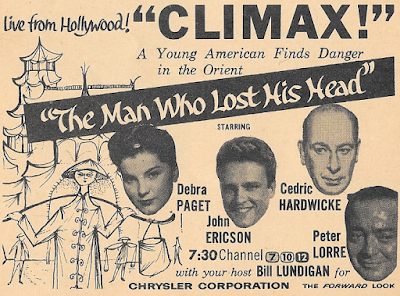
t t t
On Sunday afternoon, CBS's You Are There presents "The Fight at the O.K. Corral," reported by Walter Cronkite and staff. You Are There was a great way of introducing people, especially young viewers, into historical events by covering them as if they were occurring today, with analysis, interviews, and the like.
The cast includes Robert Bray, John Larch, and John Anderson as the Earps, DeForest Kelley as Ike Clanton, and Arthur Rease and Ernest Baldwin as the McLowrys. When I read this to my wife, she immediately commented, "So ' Spectre of the Gun ' wasn't DeForest Kelley's first trip to the OK Corral!" No, it wasn't—but talk about missed opportunities! In that classic Star Trek episode, Bones plays not Ike Clanton, but Tom McLowry. I suppose Kirk, as the captian, has to play Ike, leader of the Clantons—but still, wouldn't it have been great for Kelley to revisit the same role in a different show twelve years later? Quick quiz: how many actors have played the same historical character in multiple series?
That's followed, on NBC, by Ford Theatre, with Edward G. Robinson in "A Set of Values." And on CBS, it's Four Star Playhouse, this week featuring Dick Powell in "Success Story." A very big lineup of stars, indeed.
t t t
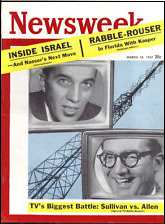 Starting in 1956, Steve Allen helmed his own NBC variety show which, at the beginning, aired opposite that of Ed Sullivan. It didn't run as long as Ed's, of course, but then Allen said his goal was never to conquer Ed, but to coexist with him, which he did for several seasons. Let's see who gets the best of the contest this week.
Starting in 1956, Steve Allen helmed his own NBC variety show which, at the beginning, aired opposite that of Ed Sullivan. It didn't run as long as Ed's, of course, but then Allen said his goal was never to conquer Ed, but to coexist with him, which he did for several seasons. Let's see who gets the best of the contest this week.Sullivan: Ed's guests include: the Ames Brothers, singing quartet; veteran song-and-dance man Ted Lewis; T.C. Jones, impersonator now performing in the Broadway musical "New Faces"; operatic soprano Elaine Malbin; comedian Larry Daniels; and the Fredonis, acrobatic team.
Allen: Comedienne Judy Holliday, comic Buddy Hackett and the singing Four Lads are Steve's guests tonight. In a special remote from Birdland, a jazz spot in New York City, we see Count Basie and his band perform.
Well. Ted Lewis was very well-known in his day; after all, you don't get the moniker "Mr. Entertainment" for nothing. And of course the best-known of the Ames brothers was Ed, who went on to great fame as a solo singing act and as an actor in Daniel Boone, and even greater fame as a tomahawk thrower on The Tonight Show. But let's get real: Judy Holliday was an Academy Award winner, Buddy Hackett had a great stand-up career, and Count Basie! I think that's more than enough to give Allen the edge this week.
Incidentally, according to the TV Teletype, CBS and NBC are "at loggerheads" about Steverino's recent ratings victory over Ed, 20.2 to 14.8. CBS claims it was because people were excited to see Elvis Presley's "new look" on the Allen show, while NBC counters that viewers are tired of watching "tired old film clips" on Sullivan, and want something "more concrete." That appearance by Elvis, on the July 1 show, is something of a story in itself, often referred to as Elvis's most embarrassing moment on television, with the centerpiece being Presley, dressed in tuxedo (the "new look"), singing "Hound Dog" to a live basset hound.
Allen had seen Presley in his TV debut on the Dorsey Brothers show, and had been impressed by "the way he conducted himself, the way he put a song over." He booked Elvis for his new weekly series (in fact, July 1 was only Allen's second show), but always denied that he, or the network, had ordered Presley to tone down his gyrations. (Ed Sullivan, who would profit from Elvis as much as anyone, had described that first TV appearance as "unfit for family viewing.") He also denied that the skit was intended to make fun of Presley and his music. Nonetheless, many who saw it would view the skit as just that, an attempt to neuter and belittle the future King. Said Elvis, "It was the most ridiculous appearance I ever did and I regret ever doing it." (You can read more about it here .)
I think that in this case, CBS is right; the audience did tune in to see Elvis. But was it really all that bad? Here's the video; you decide for yourself.
t t t
In sports, this week's programming consists mostly of baseball and boxing (nothing earth-shattering), so the real action is off the field. ABC will be covering the College All-Star football game, pitting the NFL champion Cleveland Browns against a team of the year's best college all-stars, on August 10. Meanwhile, NBC has locked up the television rights to both the World Series and the baseball All-Star Game for another five years, with Gillette paying $3.25 million per year for radio and TV rights.* Next year, NBC adds its Saturday Game of the Week to its TV coverage. Finally, CBS will introduce the National Hockey League to American network television for the first time, televising ten Saturday afternoon games from January through March of next season.
*With most proceeds going to the Baseball Players Pension Fund. Times have changed, as we say so often.
We also learn from the Teletype that "TV has arrived." Proof is that Budd Schulberg is doing a "TV exposé story" for the big screen, starring Andy Griffith. The name of that movie? A Face in the Crowd , of course.
t t t
And now to the classy part of the programming week. On Monday night, Producers' Showcase presents a color broadcast of Rosalinda (7:00 p.m., NBC), an adaptation of Johann Strauss's operetta Die Fledermaus, starring the great Cyril Ritchard, Jean Fenn, and Lois Hunt. Now, I admit that Fledermaus isn't particularly my cup of tea, but I think it makes for a great evening of light entertainment on television. And, of course, anything with Ritchard (Captain Hook in Peter Pan) is worth watching.
Later on Monday, a special episode of ABC's Voice of Firestone (7:30 p.m.) presents three top winners of the "Metropolitan [Opera] Auditions of the Air." As it happens, this is one of the last years for the Auditions of the Air; the Met has since replaced them with the National Council Auditions. But there were some pretty distinguished winners in the past, including Robert Merrill and Regina Resnik. Of the three winners, none had a more distinguished career than Carlotta Ordassy , who sang nearly 800 performances over a twenty-year career at the Met.
Another worthy show is Fred Waring's 40th anniversary show, at 10:00 p.m. Tuesday on NBC. Unless you're into the Time-Life type of Christmas albums, you might not remember Fred Waring*, but in the years before and after World War II, Fred Waring and His Pennsylvanians was one of the most popular singing groups in America, in the fashion (though not the style) of Mitch Miller and Ray Coniff. Here's a sample:
*Fun fact: Fred Warning was also the George Foreman of his time, investing in and promoting a very popular kitchen gadget: the Waring Blender.
Again, I'm not sure I'd say this was my style, and I don't know that anyone would go for this kind of music today, but that's not the point—the point is that television today is poorer for not having musical programs such as this. Unless you count the screaming divas on shows like The Voice. Which I don't.
t t t
 Finally, every once in a while we'll run across an issue that gives us more information about movie programs that have an overall title—you know, like NBC's Saturday Night at the Movies. Some of these may have been local programs, while others were syndicated packages, but whatever the reason, many of these programs have wonderful titles - as we see this week.
Finally, every once in a while we'll run across an issue that gives us more information about movie programs that have an overall title—you know, like NBC's Saturday Night at the Movies. Some of these may have been local programs, while others were syndicated packages, but whatever the reason, many of these programs have wonderful titles - as we see this week.For example, there's Family Playhouse, which airs on both WLW-T (Cincinnati) and WLW-D (Dayton). I'll admit this one is kind of confusing, seeing as how they air at 11:15 and 11:30 p.m. respectively, a time when most of the family tends to be in bed. A more neutral title, not to mention one that just makes you feel happy, is Bluebird Theater, on WLW-C in Columbus at 11:15 p.m. Armchair Theater, at 10:45 p.m. on WBNS in Columbus, is pretty descriptive: unless you're already in bed, that's probably where you're watching the movie. But then you should be watching Home Theater, at 11:20 p.m.
Some titles are more descriptive: on weekdays at 4:30 pm, WKRC in Cincinnati has Ladies' Home Theater - try getting a title like that on the air today. WTVN in Columbus has Midday Movie at 12:30 p.m.—very descriptive, even if midday is technically noon—which is when WCPO in Cincinnati has Movie Matinee. Seems things would have worked better if they'd just switched titles. WTVN has Early Home Theater at 9:30 p.m., which really isn't all that early, unless you compare it to Evening Theater on WHIO in Dayton at 11:50 p.m.; more like night than evening.
Then there are the programs that have a number in them, such as Theater Five, but you never know if the number in the title refers to the channel number or the time of day. Thus, we're understandably thrown for a brief loop when WLW-C, Channel 4, has Theater Five on at five. At least WBNS, also known as Channel 10, covers its bases with Channel Ten Theater, Saturday night at 10:30 p.m. If only they could have moved the start time up by a half hour, there wouldn't be any confusion at all.
Finally, there's truth in advertising. Hollywood Theater, on WCPO, isn't from Hollywood at all, or at least not on Tuesday night: the 11:00 p.m. feature is Genghis Khan, made in the Philippines. And Million Dollar Theater, which appears in one form or another in many markets but here happens to be on WKRC, begs the question as to whether these movies are really worth a million.
Great titles, huh? Do you remember any from your area? TV
Published on July 20, 2019 05:00
July 19, 2019
Around the dial
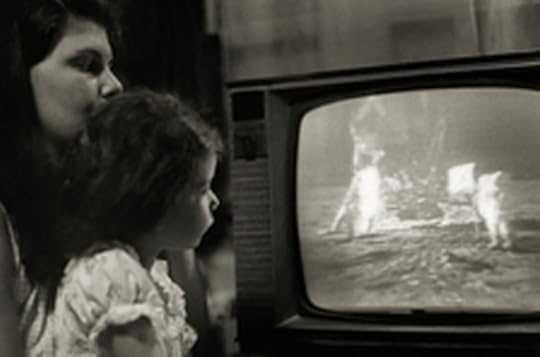 Seeing as how we're celebrating the 50th anniversary of man's first steps on the moon, it seems appropriate to start with Jordan's review at The Twilight Zone Vortex of the fourth-season episode, "
The Parallel
," a mediocre yet intriguing story of bad things that can happen to you if you fly into space.
Seeing as how we're celebrating the 50th anniversary of man's first steps on the moon, it seems appropriate to start with Jordan's review at The Twilight Zone Vortex of the fourth-season episode, "
The Parallel
," a mediocre yet intriguing story of bad things that can happen to you if you fly into space.Britain's newspaper The Sun isn't necessarily the most family-friendly source you can find, but this week it offers this fascinating story of how the BBC almost missed Neil Armstrong's giant leap for mankind .
At bare-bones e-zine, Jack's Hitchcock Project on writer Arthur A. Ross takes us to the ninth-season episode " Anyone for Murder? " a droll look at marital murder for-hire with Barry Nelson, Patricia Breslin, Edward Andrews, and Richard Dawson.
It's F Troop Friday at The Horn Section, and for our viewing pleasure, Hal looks at " The Girl From Philadelphia ," featuring a rare siting of former No Time for Sergeants co-star Laurie Sibbald, as well as an appearance by former Tammy star Linda Marshall.
At Cult TV Blog, John travels to the land of The X-Files and looks at " The Erlenmeyer Flask ," one of the show's all-time great episodes; the first-season finale, and the end of the character known and loved as "Deep Throat."
Two of my favorite personalities celebrate birthdays on the same day this week, as covered by two of my favorite people: Carol celebrates Bob Crane's birthday at Bob Crane Life & Legacy, while Jodie honors the Old Tiger , Dave Garroway, at Garroway at Large.
At Television's New Frontier: The 1960s, we're introduced to the 1961 Australian Western series Whiplash , starring Peter Graves, based more or less on a true story, which was syndicated in the United States and other countries.
One more moon story for the week: the July 15, 1989 TV Guide features Isaac Asimov discussing what he'd do on the moon. That plus a story on Sesame Street, the highlights from TV 30 years ago, and much more at Television Obscurities. TV
Published on July 19, 2019 05:00
July 17, 2019
TV Guide and Apollo 11
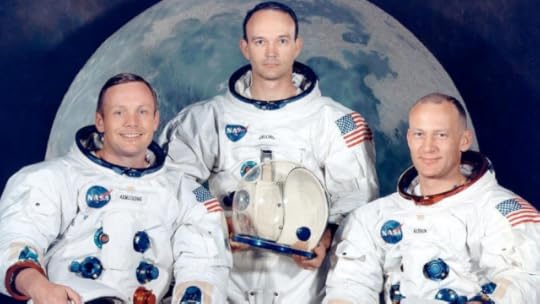 Imagine if television cameras had been present when Columbus sailed for the New World? Or when Lewis and Clark set off on their expedition? Or when Lindbergh flew across the Atlantic? That is only the beginning of what it was like when man set foot on the moon, and this time we were all present, thanks to television. In recognition of the 50th anniversary of this most monumental of events, I hand things over once again to Tom Rednour for this illustrated guide to TV Guide's coverage of Apollo 11.
Imagine if television cameras had been present when Columbus sailed for the New World? Or when Lewis and Clark set off on their expedition? Or when Lindbergh flew across the Atlantic? That is only the beginning of what it was like when man set foot on the moon, and this time we were all present, thanks to television. In recognition of the 50th anniversary of this most monumental of events, I hand things over once again to Tom Rednour for this illustrated guide to TV Guide's coverage of Apollo 11.by Tom Rednour
Practically every TV Guide and space memorabilia collector has the July 19, 1969 issue that featured Neil & Buzz on the moon. Excellent issue, with feature articles by Neil Hickey and Walter Cronkite. But what programs aired before the mission and what follow-up shows aired after the mission? Well, I'm here to tell you!
TV Guide helped us to watch the space race, live in living rooms across the US (see my "TV Guide and the space race" on this website ). The magazine also prepared us for the historic landing on the moon by letting us know of special programming before the mission got under way. Unless noted, all items are from New York Metro editions.
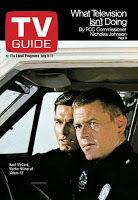 July 5-11, 1969
July 5-11, 1969 A week before the mission was to get underway, NET (now PBS) aired a documentary about the moon: "Harold Urey: The Man And The Moon," which was produced by KEBS, San Diego. (Chicago Metro edition: WTTW)
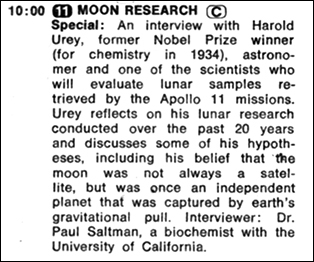 _________________________________________________________________
_________________________________________________________________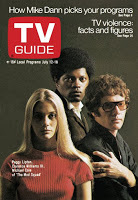 July 12-18
July 12-18The week of the launch, TV Guide offered this programming reminder about the pre-mission press conference (which aired live on Monday, July 14). This close-up laid out the plans. And the magazine let us know about that special issue next week.

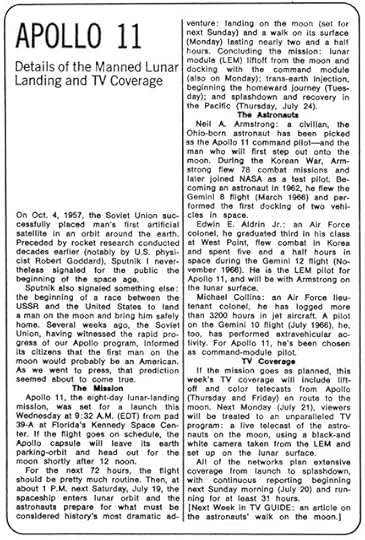 _________________________________________________________________
_________________________________________________________________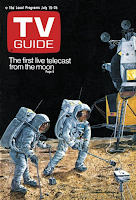 July 19-25
July 19-25See Mitchell's previous post, " This week in TV Guide: July 19, 1969 "
_________________________________________________________________
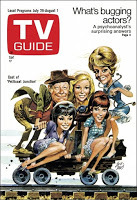 July 26-August 1
July 26-August 1President Nixon's trip to Asia was the highlight of this issue
_________________________________________________________________
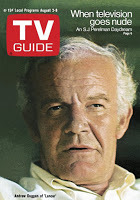 August 2-8
August 2-8After the successful completion of the mission, The Doan Report was all aglow about the coverage.
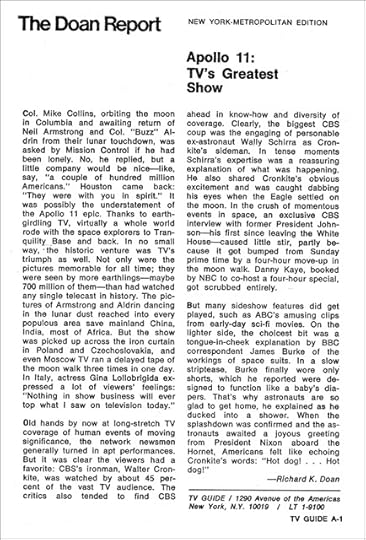 _________________________________________________________________
_________________________________________________________________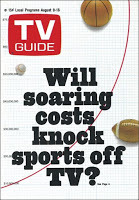 August 9-15
August 9-15After the astronauts completed their quarantine period on August 12, they held a press conference in Houston. The following day (August 13), they made their "victory lap" of the U.S. All of these events were noted in programming reminders. All networks covered these events live, with the State Dinner lasting well into the early morning hours of August 14.
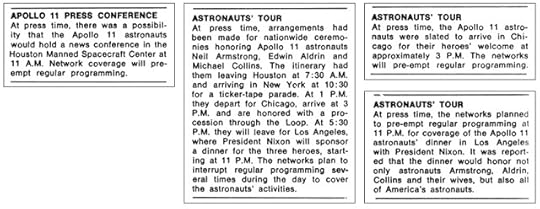 _________________________________________________________________
_________________________________________________________________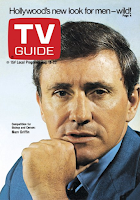 August 16-22
August 16-22CBS News scored the first interview with Armstrong, Collins, and Aldrin on Sunday, Aug 17.
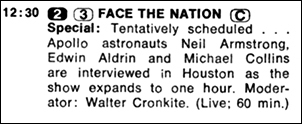 _________________________________________________________________
_________________________________________________________________ August 23-29
August 23-29Tue, Aug 26 - CBS: "The Heritage Of Apollo"
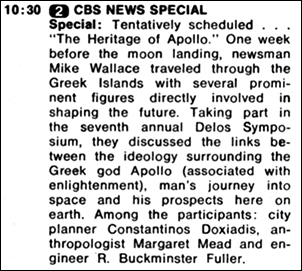 _________________________________________________________________
_________________________________________________________________Of course, TV Guide got letters about the coverage, the event, and TV Guide itself (from 8/2, 8/9, and 8/16 issues):
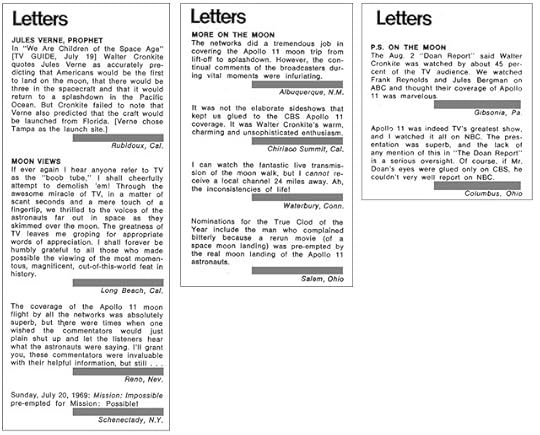 _________________________________________________________________
_________________________________________________________________In the July 19 issue, the TV Teletype had this little blurb:

Unfortunately, we'd have to wait until Tuesday, September 8, 1970 to see that special, truncated by 15 minutes for a CBS Sports College football pre-season feature. Parts of the special were recycled for the 20th anniversary special. (Northern New England edition: WABI, WHDH, WGAN)
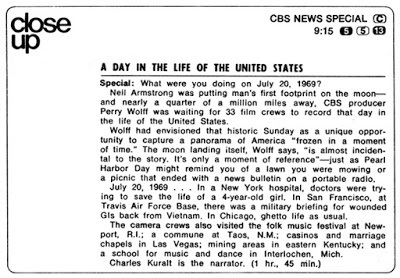 _________________________________________________________________
_________________________________________________________________You see—you don't have the "complete" Apollo 11 TV Guide issues without the pre- and post-mission issues. TV

Published on July 17, 2019 05:00
July 15, 2019
What's on TV? Saturday, July 11, 1964
 Today's July 11—7/11. Should be a lucky day, right? Actually, there wasn't a lot to choose from this week, with the convention coverage dominating the weeknight schedule. There's still a lot of political programming today, with ABC devoting three separate half-hours to convention prep. There's plenty more to the day, though, including Wide World of Sports coverage of Champagne Tony Lema's victory in the British Open. The listings are from the Twin Cities.
Today's July 11—7/11. Should be a lucky day, right? Actually, there wasn't a lot to choose from this week, with the convention coverage dominating the weeknight schedule. There's still a lot of political programming today, with ABC devoting three separate half-hours to convention prep. There's plenty more to the day, though, including Wide World of Sports coverage of Champagne Tony Lema's victory in the British Open. The listings are from the Twin Cities.4 WCCO (CBS)
Morning
6:30 SUMMER SEMESTER—Education
7:00 CAPTAIN KANGAROO—Children
8:00 ALVIN—Cartoons
8:30 TENNESSEE TUXEDO
9:00 QUICK DRAW McDRAW
9:30 MIGHTY MOUSE—Cartoons
10:00 RIN TIN TIN—Western
10:30 ROY ROGERS—Western
11:00 SKY KING—Adventure
11:30 SUPERCAR—Children
Afternoon
12:00 NEWS—Don Dahl
12:15 WEATHER—Bob Potter
12:20 SPORTS—Hal Scott
12:30 HOPALONG CASSIDY—Western
1:30 SATURDAY SPORTS SPECIALPolo: Twin Cities vs. Milwaukee
3:00 RIVERBOAT—Drama
4:00 CALL YOUR SHOT—Billiards
4:30 DIVORCE COURT—Drama
5:30 RAMAR OF THE JUNGLE
Evening
6:00 NEWS—Dave Moore
6:15 SPORTS—Don Dahl
6:25 WEATHER—Don O’Brien
6:30 LUCY-DESI COMEDY HOUR
7:30 DEFENDERS—Drama
8:30 SUMMER PLAYHOUSE—Comedy
9:00 GUNSMOKE—Western
10:00 NEWS—Dave Moore
10:15 WEATHER—Bud Kraehling
10:20 SPORTS—Don Dahl
10:30 MOVIE—DramaCritics Award: “The Tell-Tale Heart” (English; 1962)
12:00 NEWS—Dave Moore
12:15 MOVIE—Comedy “Angels’ Alley” (1948)
1:15 NIGHT KAPPERS—Carlson
5 KSTP (NBC)
Morning
7:30 MINNESOTA FARM SCENE
8:00 ANDY’S GANG—Children
8:30 RUFF AND REDDY COLOR
9:00 HECTOR HEATHCOTE COLOR
9:30 FIREBALL XL-5—Children
10:00 DENNIS THE MENACE—Comedy
10:30 FURY—Adventure
11:00 BULLWINKLE COLOR
11:30 MR. WIZARD—Science
Afternoon
12:00 SOLDIERS OF FORTUNE
12:30 FAMOUS PLAYHOUSE—Drama
1:00 MOVIE—Musical“You Were Never Lovelier” (1942)
2:30 MOVIE—Comedy “Special Delivery” (German; 1955)
4:00 FAMOUS PLAYHOUSE—Drama
4:30 NBC SPORTS SPECIAL COLOR Speedboat racing, trampoline exhibition, AAU Diving Championships
5:00 CALVIN GRIFFITH COLOR
5:15 NEWS—Sander Vanocur
5:30 LOVE THAT BOB!—Comedy
Evening
6:00 NEWS—Bob Ryan COLOR
6:15 WEATHER—Morris COLOR
6:20 SPORTS—Al Tighe COLOR
6:30 LIEUTENANT—Drama
7:30 JOEY BISHOP—Comedy COLOR
8:00 MOVIE—DramaSaturday Night at the Movies: “Edge of the City” (1957)
10:00 NEWS—Bob Ryan COLOR
10:15 WEATHER—Morris COLOR
10:20 SPORTS—Al Tighe COLOR
10:30 MOVIE—Musical COLOR “Something for the Boys” (1944)
12:10 MOVIE—Melodrama“Jungle Captive” (1945)
9 KMSP (ABC)
Morning
9:00 GRANDPA KEN AND HIS PALS
9:30 ALLAKAZAM—Children
10:00 CASPER—Cartoons
10:30 BEANY AND CECIL—Cartoons
11:00 BUGS BUNNY—Cartoons
11:30 AMERICAN BANDSTAND—ClarkGuests: Roger Miller, Johnny Rivers
Afternoon
12:30 WIRE SERVICE—Drama
1:30 26 MEN—Western
2:00 MR. LUCKY—Adventure
2:30 TIGHTROPE!—Police
3:00 WRESTLING CHAMPIONS
4:00 WIDE WORLD OF SPORTSBritish Open; Firecracker 400
5:30 GOP CONVENTION—Preview SPECIAL “San Francisco: The Convention City”
Evening
6:00 RIPCORD—Adventure COLOR
6:30 GOP CONVENTION—Preview SPECIAL “The Woman’s Touch in Politics”“Hootenanny” is pre-empted.
7:00 GOP CONVENTION—Preview SPECIAL GOP platform battle
7:30 LAWRENCE WELK—Music
8:30 HOLLYWOOD PALACE—VarietyHost: Dale Robertson. Guests: Vic Damone, Jane Morgan, Red Buttons, the Smothers Brothers, the Four Amigos, Russ Lewis, the Harris Nelson family
9:30 JO STAFFORD—Variety SPECIAL Guests: Peter Sellers, Graham Starke
10:30 MOVIE—Drama“Run Silent, Run Deep” (1958)
11 WTCN (IND.)
Morning
10:45 CARTOON CIRCUS—Children
11:00 CHAMPIONSHIP BRIDGE—Goren
11:30 KING AND ODIE--Cartoon
Afternoon
12:00 LUNCH WITH CASEY—Children
1:00 ROUNDHOUSE RODNEY
1:30 RANGE RIDER—Western
2:00 CHAMPIONSHIP BOWLINGBilly Welu vs. Dave Soutar
3:00 ROCKY AND HIS FRIENDS
3:30 MOVIE—Adventure“The Seven Tasks of Ali Baba” (Italian; 1960)
5:30 SEA HUNT—Adventure
Evening
6:00 ALL STAR WRESTLING
7:30 MOVIE—Adventure“Tarzan and the Amazons” (1945)
9:00 RANCH PARTY—Music
9:30 NEWS—Dick Ford
9:45 WEATHER—Stuart A. Lindman
9:50 SPORTS—Buetel, Horner
10:00 MOVIE—Drama“Commando Strike at Dawn” (1942)
12:00 ONE STEP BEYOND—Drama Time approximate
TV
Published on July 15, 2019 05:00
July 13, 2019
This week in TV Guide: July 11, 1964
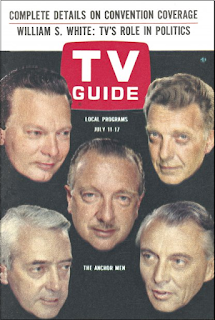 Why, in the name of all that is good and holy, I would want to spoil a lovely summer day by writing about politics is beyond me. But here we are, about to embark on a TV Guide review that's going to be probably 80% politics.
Why, in the name of all that is good and holy, I would want to spoil a lovely summer day by writing about politics is beyond me. But here we are, about to embark on a TV Guide review that's going to be probably 80% politics.There's a difference though, unless I'm fooling myself (which is entirely possible), because this issue originates from a lost world, a world featuring the glamour and status of the network anchorman, and the importance to the political process of the presidential nominating convention.
The cover story is the Republican National Convention at San Francisco's Cow Palace, where the GOP meets to choose a candidate to face Lyndon Johnson in November. Television is there to provide gavel-to-gavel coverage of the convention, one of the last of the great knock-down, drag-out brawls that not only made conventions so entertaining, but also demonstrates why political parties no longer hold them. Oh, they still call them conventions, but you and I both know they’re really just week-long political infomercials.
The five men on the cover: Walter Cronkite, who within a decade will be the most trusted man in American; Chet Huntley and David Brinkley, whom NBC bills in their convention ads as the “San Francisco Giants”; and ABC’s new team of Howard K. Smith and Edward P. Morgan, trying to bring credibility—and sex appeal—to the network’s news division. And it's interesting to see the esteem with which the news anchors are treated. TV news is still, at this point, in something of its infancy—CBS and NBC only went to half-hour newscasts a few months before, and ABC won’t follow suit until 1967. The news anchors of the time are portrayed as serious and authoritative, likely because of the emotional connection they made with viewers during the assassination and its aftermath.
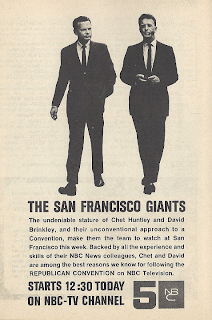 Most historians say that television came of age with its coverage of the Kennedy assassination, and the five men here can all testify to that. Huntley and Brinkley dominated that coverage, ratings-wise, with more people watching NBC than CBS and ABC combined,* and NBC comes to the convention as the network to beat, so to speak. Cronkite, whose announcement of Kennedy’s death has since become the iconic image of the event, is not yet the revered institution he will become; in fact, so thoroughly is CBS trounced by NBC in the GOP convention ratings that Uncle Walter will be replaced by Robert Trout and Roger Mudd for the Democratic convention the following month. Smith and Morgan were the prime anchors for ABC’s coverage of JFK's funeral, and won enough critical (and viewer) approval that the network teamed them up for the '64 conventions (even though Ron Cochran continues to anchor the network’s evening news until 1965).
Most historians say that television came of age with its coverage of the Kennedy assassination, and the five men here can all testify to that. Huntley and Brinkley dominated that coverage, ratings-wise, with more people watching NBC than CBS and ABC combined,* and NBC comes to the convention as the network to beat, so to speak. Cronkite, whose announcement of Kennedy’s death has since become the iconic image of the event, is not yet the revered institution he will become; in fact, so thoroughly is CBS trounced by NBC in the GOP convention ratings that Uncle Walter will be replaced by Robert Trout and Roger Mudd for the Democratic convention the following month. Smith and Morgan were the prime anchors for ABC’s coverage of JFK's funeral, and won enough critical (and viewer) approval that the network teamed them up for the '64 conventions (even though Ron Cochran continues to anchor the network’s evening news until 1965).*Since hardly anyone watched ABC news, the battle between NBC and CBS was actually much closer than this statement might indicate.
All three networks will be providing start-to-finish coverage, beginning with the opening session at noon (CT) Monday and continuing through Tuesday’s speech by former President Eisenhower, Wednesday’s nominating and balloting for president, and Thursday’s veep nomination and acceptance speeches.* In addition, there’s plenty of pre-convention coverage, programs that would be unthinkable today except on C-SPAN (I won't even include the cable news networks in this): each network has a preview show Sunday evening, and ABC has several convention-related shows on Saturday and Sunday, including an appearance by Eisenhower on the children’s show Discovery ’64, where he’ll explain the role of the convention in the democratic process.
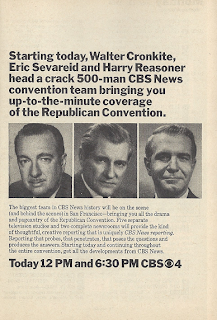 *Interesting thing here: the convention was originally scheduled to end on Friday, rather than Thursday. The difference was that in the original plan, the nominating speeches and demonstrations would take place on Wednesday, but the balloting itself would be on Thursday. That didn’t happen; it appears the schedule itself had been modified prior to the start of the convention, probably because the chance of multiple ballots had pretty much disappeared by the start of the festivities. Fortunately, TV Guide provides us with an alternate schedule of programming for Friday in case the convention’s already over.
*Interesting thing here: the convention was originally scheduled to end on Friday, rather than Thursday. The difference was that in the original plan, the nominating speeches and demonstrations would take place on Wednesday, but the balloting itself would be on Thursday. That didn’t happen; it appears the schedule itself had been modified prior to the start of the convention, probably because the chance of multiple ballots had pretty much disappeared by the start of the festivities. Fortunately, TV Guide provides us with an alternate schedule of programming for Friday in case the convention’s already over.The convention itself is a riotous affair, with more entertainment value than probably the last ten conventions combined. The eventual nominee, Arizona senator Barry Goldwater, has more than enough delegates to win, barring any kind of last-minute turnaround. The platform fight, mostly over the civil rights plank, is particularly nasty; when Goldwater's bitter arch-rival, New York governor Nelson Rockefeller, takes to the podium to support a liberal plank denouncing “extremism,” he's shouted down by the delegates* (a grinning Rockefeller taunts them, like a kid prodding a lion with a stick, which produces great theater and proves Rocky’s point about the extremism of the Goldwater delegates). Rockefeller’s surrogate, Pennsylvania governor William Scranton, puts himself up as a last-minute candidate, though he has no hope of winning.
*Rockefeller's personal life (he was divorced and remarried) was a point of contention with conservative GOP voters; one delegate, according to Theodore H. White, taunted Rocky during this demonstration by shouting, "You lousy lover!"
This new, more conservative GOP also expresses its distrust of the news media—increasingly personified by television. For many, Huntley and Brinkley, the top dogs in the news game, epitomized the liberal bias of the eastern media establishment. “You know,” one delegate was overheard to say, “these nighttime news shows sound to me like they’re being broadcast from Moscow.” When Eisenhower, in his speech, referred to “sensation-seeking columnists and commentators” seeking to divide the GOP, the delegates roared their approval, shaking their fists at the commentators in their booths. One of the unquestionable highlights of the television coverage was the arrest of NBC floor reporter John Chancellor for blocking the aisle; as you can see in the video, his colleagues expressed grave concern for his welfare.
Goldwater, in his acceptance speech on Thursday night, utters one of politics' most famous lines (or infamous, depending on how you look at it), telling the delegates that "Extremism in the defense of liberty is no vice. And moderation in the pursuit of justice is no virtue." He goes on to a resounding defeat at the hands of LBJ in November (winning less than 40% of the popular vote), surely in part by the negative impression left by television coverage of the convention. The grassroots movement he creates, however, helps to lay the groundwork for the victory of Ronald Reagan 16 years later.*
*As did Reagan's speech on behalf of Goldwater in the final weeks of the campaign.
As both a TV fan and a political junkie, I can only lament the change in conventions from meetings where things actually got done to slick television productions that nobody watches. However, in 1964 the process has already begun; media representatives outnumber delegates by two to one.
t t t
Here’s something else you’re not likely to see nowadays. NBC news correspondent Nancy Dickerson appears in a feature on the convention—but if you’re looking for her analysis of the party platform or her predictions for the winners, you’re out of luck. Instead, TV Guide “asked her to model some of the clothes she plans to wear on the convention floor.” There’s a pink-and-white checkered number by Gustave Tassell, a navy silk twill suit with white blouse by Yves St. Laurent, and a two-piece green sleeveless top by Geoffrey Beene.
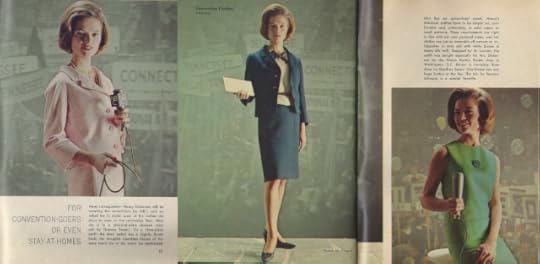
But then, who's Nancy Dickerson in the long run? After all, she only scooped everyone at the Democratic convention and broke the news that LBJ was going to choose Hubert Humphrey as his running mate.
t t t
One thing that hasn’t changed since 1964 is the impact television has on politics. Well, actually to the extent it’s changed, it’s become even more of an impact than it was then. In an article on TV’s influence, political columnist William S. White says “there is no question among old political observers that TV unconsciously worked against Richard Nixon in 1960,” and adds that were it not for the presence of television at the 1960 Democratic Convention, LBJ probably wouldn’t have been chosen by JFK as his running mate.
“The late-night session in Los Angeles that nominated Kennedy showed a succession of urban Democratic bosses . . . at the head of the powerful blocs that put him over. Overnight, there was concern in the Kennedy camp that the country would see this as a heavy-handed urban-boss bulldozer movement flinging all resistance out of its way.” That image had to be softened, and the way to do it was to find someone from the Southwest, a Protestant, with connections to rural and small town America. In other words, Johnson.
White feels that television can do a very good job of covering politics, and that it will be essential for the successful politician to learn how to use TV. But for all the good work that television does, it’s growing influence and efficiency mean the end of an era. “That matchless technical skill which combines the lens and the computer produces the final answers for us—tells us who has in fact won and who has in fact lost—long before the climax really should have been reached and exposed.” That’s about the size of it.
t t t
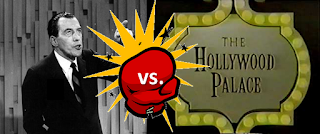 During the 60s, the Ed Sullivan Show and The Hollywood Palace were the premiere variety shows on television. Whenever they appear in TV Guide together, we'll match them up and see who has the best lineup..
During the 60s, the Ed Sullivan Show and The Hollywood Palace were the premiere variety shows on television. Whenever they appear in TV Guide together, we'll match them up and see who has the best lineup..Sullivan: On this rerun, Ed’s guests are Duke Ellington and his orchestra and musical comedy performer Liza Minnelli. The Beatles are seen in a segment taped in London on the set of their forthcoming movie. Other guests include French singer Jean Paul Vignon, British comics Morecombe and Wise, and mezzo-soprano Shirley Verrett. Also seen: films of Michelangelo’s Pieta, on display at the New York World’s Fair.
Palace: Host Dale Robertson introduces singers Vic Damone and Jane Morgan; comedian Red Buttons; the Smothers Brothers, comedy folk singers; the Four Amigos, vocal quartet; ventriloquist Russ Lewis; and the Harris Nelson family, a musical comedy act.
Well, I didn’t have to put too much thought into this week’s entry. When this show originally aired, Ed had teased it the previous week by saying, “Next week—The Beatles and the Pieta!” Add in the Duke and Liza with a Z, and even though it’s a repeat it’s still Sullivan who's number one for the week.
t t t
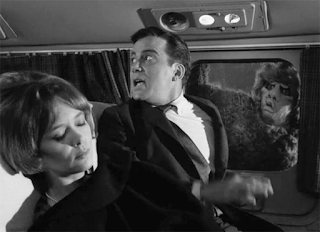 Finally, Friday winds up as the only weeknight without convention programming, and undoubtedly the highlight of the night is CBS's Twilight Zone rerun, "Nightmare at 20,000 Feet" (8:30 p.m.), and if you know your TV history, I don't have to tell you this is the episode with William Shatner and the thing on the wing, right? According to Marc Scott Zicree's Twilight Zone Companion, writer Richard Matheson wasn't happy with the gremlin; Jacques Tournier, who had been considered to direct the episode, had wanted a man in a dark body suit covered with sparkle, creating a creature lacking any definite shape or form. Richard Donner directed instead; his concept of the gremlin, felt Matheson, "looked like a teddy bear." Nevertheless, it's still considered one of the most famous and most loved episodes of the series. TV
Finally, Friday winds up as the only weeknight without convention programming, and undoubtedly the highlight of the night is CBS's Twilight Zone rerun, "Nightmare at 20,000 Feet" (8:30 p.m.), and if you know your TV history, I don't have to tell you this is the episode with William Shatner and the thing on the wing, right? According to Marc Scott Zicree's Twilight Zone Companion, writer Richard Matheson wasn't happy with the gremlin; Jacques Tournier, who had been considered to direct the episode, had wanted a man in a dark body suit covered with sparkle, creating a creature lacking any definite shape or form. Richard Donner directed instead; his concept of the gremlin, felt Matheson, "looked like a teddy bear." Nevertheless, it's still considered one of the most famous and most loved episodes of the series. TV
Published on July 13, 2019 05:00
It's About TV!
Insightful commentary on how classic TV shows mirrored and influenced American society, tracing the impact of iconic series on national identity, cultural change, and the challenges we face today.
- Mitchell Hadley's profile
- 5 followers



